#it's taken over a decade and a remake coming out for me to actually play one of my all time favorite games
Text
i finished dead space (2023)!! and i finished dead space (2008) a couple days ago!!!
#it's taken over a decade and a remake coming out for me to actually play one of my all time favorite games#tbf it's an entertaining one to watch other people play#:3 now i just have to finish dead space 2#and uh#if i feel like it i guess i could play dead space 3#but it just like#it's painful enough watching it be played lol#i could force dystriplica to play the co-op with me#'hey you wanna play a game that just really fucking sucks?'
1 note
·
View note
Text
Press/Gallery: How Elizabeth Olsen Brought Marvel From Mainstream to Prestige
“The thing I love about being an actor is to fully work with someone and try so hard to be at every level with them, chasing whatever it is you need or want from them.”
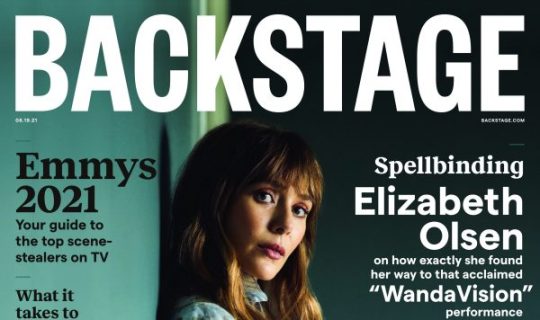
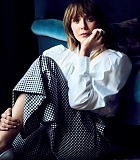
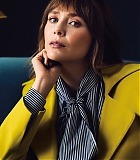
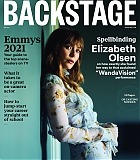
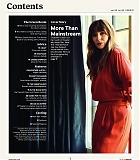
GALLERY LINKS
Studio Photoshoots > 2021 > Session 008
Magazine Scans > 2021 > Backstage (August 19)
Backstage: Elizabeth Olsen grins widely over video chat when recalling many such moments on set with her co-stars. Yet, she can’t bring herself to divorce such a lofty vision of film acting from the technical multitasking it requires. The camera sees all.
“But then you move your hair, and you’re in your brain, like: OK, remember that! Because I don’t want to edit myself out of a shot. I know some actors are like, ‘Continuity, shmontinuity!’ But the good thing about continuity is, if you remember it, you’re actually providing yourself with more options for the edit.”
That need to balance being both inside the scene and outside of it, fully living it and yet constantly visualizing it on a screen, feels particularly apt in light of Olsen’s most recent project, “WandaVision.”
The mysteries at the heart of the show grow with every episode, each fast-forwarding to a different decade: Could this 1950s, black-and-white, “filmed in front of a studio audience” newlyweds bit be a grief-stricken dream? Might this ’70s spoof be a powerful spell gone awry? Could this meta take on mockumentary comedies be proof that the multiverse is finally coming to the Marvel Cinematic Universe?
The series’ structure, which branches out to include government agents intent on finding out why Westview has seemingly disappeared, calls for the entire cast to play with a mix of genres, balancing a shape-shifting tone that culminates in an epic, MCU-style conclusion. What’s key—and why the show struck a chord with audiences during its nine-episode run—is the miniseries’ commitment to grounding its initial kooky setups and its later special effects-driven spectacle in heartbreaking emotional truths. It’s no small feat, though it’s one that can often be taken for granted.
“I was thinking how hard it would have been to have shot the first ‘Lord of the Rings,’ ” Olsen muses. “Like, you’re putting all these actors [into the frame] later and at all these different levels. All the eyelines are completely unnatural. And yet the performances are fantastic! And technically, they are so hard. People forget sometimes that these things are really technically hard to shoot. And if you are moved by their performance, that took a lot of multitasking.”
As someone who has learned plenty about harnesses, wirework, fight choreography, and green screens (she’s starred in four Marvel movies, including the box office megahit “Avengers: Endgame,” after all), Olsen knows how hard it can be to wrap one’s brain around the work needed to pull off those big, splashy scenes.
“If you think about it, it’s, like, the biggest stakes in the entire world—every time. And that feels silly to act over and over again, especially when people are in silly costumes and the love of your life is purple and sparkly, and every time you kiss them, you have to worry about getting it on your hands. Those things are ridiculous. You feel ridiculous. So there is a part of your brain that has to shovel that away and just look into someone’s eyeballs—and sometimes, they don’t even have eyeballs!”
The ability to spend so much time with Wanda, albeit in the guise of sitcom parodies, was a welcome opportunity for Olsen. Not only did it allow the actor to really wrestle with the traumatic backstory that has long defined the character in the MCU, but having the chance to calibrate a performance that functions on so many different levels was a thrilling challenge.
“It was such an amazing work experience,” she says. “Kathryn [Hahn] uses the word ‘profound’—which is so sweet, because it is Marvel, and people, you know, don’t think of those experiences as profound when they watch them. But it really was such a special crew that [director] Matt Shakman and [creator] Jac Schaeffer created. It was a really healthy working environment.”
Related‘WandaVision’ Star Kathryn Hahn’s Secret to Building a Scene-Stealing Performance
‘WandaVision’ Star Kathryn Hahn’s Secret to Building a Scene-Stealing Performance
Considering that the miniseries spans several sitcom iterations, various layers of televisual reality, and a number of character reveals that needed to feel truthful and impactful in equal measure, Shakman’s decision to work closely with his actors ahead of shooting was key.
“We truly had a gorgeous amount of time together before we started filming,” Olsen remembers. “Our goal was—which is controversial in TV land—that if you wanted to change [anything], like dialogue in a scene, you had to give those notes a week before we even got there. Because sometimes you get to set, and someone had a brilliant idea while they were sleeping, and you’re like, ‘We don’t have an hour to talk about this. We have seven pages to shoot.’ And so, we were all on the same page with one another, knowing what we were shooting ahead of time.
“Matt just treated us like a troupe of actors who were about to do some regional theater shit,” she adds with a smile.
That spirit of camaraderie was, not coincidentally, at the heart of Olsen’s breakout project, Sean Durkin’s 2011 indie sensation “Martha Marcy May Marlene.” As an introduction to the process of filmmaking to a young stage-trained actor, Durkin’s quietly devastating drama was a dream—and an invaluable learning opportunity.
“It was truly just a bunch of people who loved the script, who just were doing the work. I didn’t understand lenses, so I just did the same thing all the time. I never knew if the camera would be on me or not. There was just so much purity in that experience, and you only have that once.”
The film announced Olsen as a talent to watch: a keen-eyed performer capable of deploying a stilted physicality and clipped delivery, which she used to conjure up a wounded girl learning how to shake off her time spent in a cult in upstate New York. But Olsen admits that it took her a while to figure out how to navigate her career choices afterward. In the years following “Martha,” she felt compelled to try on everything: a horror flick here, a high-profile remake there, a period piece here, an action movie there. It wasn’t until she starred in neo-Western thriller “Wind River” (alongside fellow Marvel regular Jeremy Renner) and the dark comedy “Ingrid Goes West” (opposite a deliciously deranged Aubrey Plaza) that Olsen found her groove.
“It was at that point, when I was five years into working, where I was like, Ah, I know how I want it. I know what I need from these people—from who’s involved, from producers, from directors, from the character, from the script—in order to trust that it’s going to be a fruitful experience.”
As Olsen looks back on her first decade as a working actor, she points out how far removed she is from that young girl who broke out in “Martha Marcy May Marlene.”
“I feel like a totally different person. I don’t know if everyone who’s in their early 30s feels like their early 20s self is a totally different human. But when I think about that version of myself, it feels like a long time ago; there’s a lot learned in a decade.”
Those early years were marked by a self-effacing humility that often led Olsen to defer to others when it came to key decisions about the characters she was playing. But she now feels emboldened to not only stand up for herself and her choices but for others on her sets as well.
“[Facebook Watch series] ‘Sorry for Your Loss’ I got to produce, and I really found my voice in a collaborative leadership way. And with ‘WandaVision,’ Paul [Bettany] and I really took on that feeling, as well—especially since we were introducing new characters to Marvel and wanted [those actors] to feel protected and helped,” she says. “They could ask questions and make sure they felt like they had all the things they needed because sometimes you don’t even know what you need to ask.”
It’s a lesson she learned working with filmmaker Marc Abraham on the Hank Williams biopic “I Saw the Light,” and she’s carried it with her ever since. “I really want it to feel like we’re all in this together, as a team,” Olsen says. “That was part of ‘Sorry for Your Loss’ and it was part of ‘WandaVision,’ and I hope to continue that kind of energy because those have been some of the healthiest work experiences I’ve had.”
If Olsen sounds particularly zealous about the importance of a comfortable, working set, it is because she’s well aware that therein lies an integral part of the work and the process. As an actor, she wants to feel protected and nurtured by those around her, whether she’s reacting to a telling, quiet line of dialogue about grief or donning her iconic Scarlet Witch outfit during a magic-filled mid-air action sequence.
“Sometimes you’re going to be foolish, you know? And [you need to] feel brave to be foolish. Sometimes people feel embarrassed on set and snap. But if you’re in a place where people feel like they’re allowed to be an idiot,” she says, “you’re going to feel better about being an idiot.”
This story originally appeared in the Aug. 19 issue of Backstage Magazine. Subscribe here.
Press/Gallery: How Elizabeth Olsen Brought Marvel From Mainstream to Prestige was originally published on Elizabeth Olsen Source • Your source for everything Elizabeth Olsen
#Elizabeth Olsen#WandaVision#Avengers#Scarlet Witch#Wanda Maximoff#Sorry For Your Loss#Avengers Infinity War#Avengers Age of Ultron#Captain America Civil War#Ingrid Goes West#Godzilla#Doctor Strange in the Multiverse of Madness#Marvel#MCU#Candy Montgomery#Love and Death#Avengers Endgame
48 notes
·
View notes
Text
Kagerou Poject Reboot: RealSound Interview
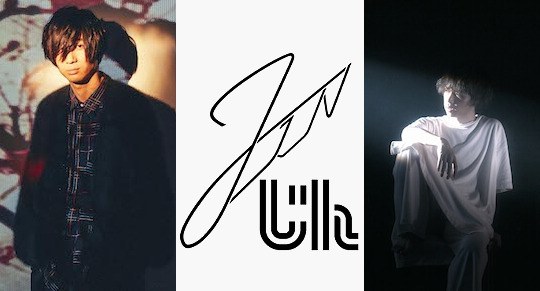
Jin x Shirakami Mashirou x Yuumao
Their takes on the changes that each of them has witnessed in the past ten years and the things they have been seeing in the whirlpool that is the VOCALOID scene.
Translation commissioned by the amazing @sodasexual!
Celebrating the tenth anniversary of Kagerou Project, the Re:boot project has commenced. An interview has been carried out to ask about its background and prospects.
The ones we have interviewed are a trio consisting of the author of Kagerou Project and multi-creator Jin, as well as Shirakami Mashirou (bass) and Yuumao (drums/Hitorie), who are also production members of the original music piece and were listed as the performance team of “Children Record (Re:boot)”, which was released the other day as the first part of the Re:boot project.
We had them talk about the true intentions behind “Re:boot”, which means “to restart”, about the recordings where they created the concept of “overcoming the original composition” and about the near future, including the new song, along with the steps they have taken in the past ten years.
The “pain” that comes with creating something unprecedented.
——How did Kagerou Project’s Re:boot project begin?
Jin: Kagerou Project was set into motion back in 2011, so this year is the turning point of ten years since then. In that meantime, there were lots of things I fretted over, but as I discussed with the people around me about whether there was anything I could do, we came up with the idea of “remaking the old compositions”. I thought if that’s what we were going to do, then I wanted to try doing it with the original members of Children Record, so I contacted the two.
——How did each of you feel when Shirakami Mashirou-san and Yuumao-san received the proposal of a remake?
Jin: Regarding Mashirou-san, I was contacting him for the first in a long time. “Let’s go out for a drive,” I told him.
Shirakami: Right, right. We went on a car drive together. Just us seeing each other already felt nostalgic in itself, so we talked like normal about lots of things and were like, “Yeah, it was fun back then”. I felt that “Aah, I’m looking forward to this”.
Jin: While talking to the staff, I honestly felt uneasy about creating something new, even though it was a remake. If I had to use a word to represent these ten years in which I’ve been writing novels and making music for Kagerou Project, it was extremely “painful” to me. So I wanted to talk to Mashirou-san first-thing. On a different occasion, when a staff member asked me, “Have you been keeping in contact with Mashirou-san lately?”, I suggested, “If it’s okay, can I contact him myself?”, and then invited him for the drive. Rather than the request for the remake, I firstly wanted to discuss with him, “I’m planning on doing this thing; what do you think?”
Shirakami: There was one more person taking part in that drive, right?
Jin: That’s right. Since the coronavirus was going on, we went driving in three separate cars, and the third person was INPNE-kun, who made the video of Children Record Re:boot. That was INPINE-kun and Mashirou-san’s first meeting. At that time, INPNE-kun hadn’t started working on the video yet, but thinking back on it now, I’m glad the two of them were introduced to each other that way. It feels like our hearts bound the music and the video together.
——Yuumao-san, what about you?
Yuumao: Jin-kun and I were seeing each other constantly. I had received a request to tackle the recordings of the songs he had been making until now. Amidst that, there was a day when I received a request, amongst other matters, and was scheduled to “record Children Record”. Up to around three days before the recording, I spent my time wondering, “What’s this supposed to be?” (laughs).
——Jin-san, what did you think when choosing Shirakami-san and Yuumao-san, the original duo?
Jin: I only felt that I wanted to do it with these two. I didn’t have any other choice in the first place. I’m awfully fond of the contents that they performed in the original song, and I had no complaints other than towards my own abilities for making musical arrangements.
——You said earlier that “the past ten years were extremely painful”, but what kind of feeling was it?
Jin: The year when I began these activities, 2011, was the time when I was attending a vocational school; the band I was playing with back then disbanded midway, but by sheer coincidence, the older brother of a friend of mine was using VOCALOIDs and he taught me about them, so I really started doing it without any backing. Having played in a band until then, there was a lot of passion and many messages that I wanted to convey inside me, so this project was about me taking them and beginning to paddle off, and one of the aspects of it was that VOCALOID made the things I wanted to do into a reality. But that was a period where it felt like the VOCALOID culture wasn’t yet acknowledged. On top of that, other than the music, Kagerou Project had novels, and a lot of it had no precedents, so I believe there were parts of it that were difficult to understand for people who weren’t already into it. I didn’t know if the path I was going through was right or wrong. But the people around me kept telling me “not to take my foot off the accelerator”. In that sense, I definitely have negative memories of it. I also had the feeling that I was estranged from the music scene.
——Indeed, the music of Kagerou Project is unmistakably rock, and I believe it was something that pierced through Japan’s rock culture, but I think you might have felt that you were not understood by the rock bands of back then.
Jin: That’s right. Surprisingly, the people around me, including creators and those who were in bands, gave off an air of ridicule with a “he’s a faker” kind of nuance to it. I understood the awesomeness of rock bands, so of course, there were times when I’d wonder, “What is it that I’m doing?”. During these ten years, there was a moment halfway when I almost broke down. Due to many primary factors, I might’ve been unable to go on – like, there was a time when I found myself thinking that it was weird to keep it up while I was so at loss. There was also a period where I was unable to create anything for Kagerou Project.
——When did that happen, exactly?
Jin: Rather than breaking down all of a sudden, it’s more like I slowly became unable to create any more. Although I was being criticized on one side, I was also being demanded on another, so I was at a level where I was obligated to write. However, while all sorts of emotions were whirling up, I suddenly thought of something. There was a time when I got closure from that feeling of “not being acknowledged” that I mentioned earlier.
——When was that?
Jin: Around the time when I was making the previous album (“Mekakucity Reload”, which was released in November 2018). I was called “inexperienced” and “unskilled” not only in the rock scene but also in the light novel scene, so I made effort to sweep it all away. It felt like I was being treated like a tumor in everything I did. But then I suddenly thought, “Yeah, that’s fine”. There was a moment one day when the mists actually cleared, like, “What was I so at loss about?” It’s not like I’ve been going at it just so that someone would praise me. If anything, I lived my life constantly being made fun of. I’m no good at sports, I’m not smart, and I by no means did I ever excel at communicating with people at all. By the moment that I thought, if this is my character, then maybe being praised isn’t the only right answer, I was suddenly alleviated. If I’m being called a “child deceiver”, then I’m going to do that with all my might and apply myself to it, is what I thought. I refused to go to school for a while when I was in middle school, yet I had the feeling that I wanted to face this part of me, not in a fashionable or trendy way but in a miserable state, and fight him head-on. I guess that’s what suited me best. To me, Shirakami-san and Yuumao-san are people with a “chosen vision”. They have the sense to perceive beauty. I think I don’t have that in me. Which is why I was in pain. I was in a dilemma where I couldn’t grasp music as an art. However, it’s not like I’m making fun of hamburgers, but I started to think that I wanted to compete using something punk, something hamburger-like. It took me a while to get there.
——How do you feel after listening to what Jin-san just said, Yuumao-san and Shirakami-san?
Yuumao: Jin-kun said just now that he was “fretting” and “stuck”, but I knew about his circumstances to a certain extent, so I imagined that he was unable to move on. But while talking about all sorts of things with Jin-kun, when producing stuff in the last three to four years, we had the feeling that it basically boils down to “if we don’t provide this and that, it won’t be interesting”. This isn’t limited to KagePro – I just personally felt that the productions of his works were shifting towards not “making something good”, but rather making something that could be properly verbalized. For me, as someone on the performing side, I was also in a situation where, rather than just providing good content one way or another, I became increasingly able to explain it. In the end, we change just like that, is what I felt. And you base yourself on this to make new songs, right?
Jin: That’s right.
Yuumao: Thought so. That’s why I feel like the stuff that will come from you in the future will have stronger colors.
——Shirakami-san, what about you? How did the scenario change in the past decade and how do you think that you have been progressing as a musician?
Shirakami: The biggest change that I felt the most on my skin is that the huge Vocaloid movement itself has completely gained familiarity with the public in the last ten years. About a while after I had started associating with Mafumafu-kun, amongst the musicians that I’ve met, the number of people who came up to tell me, “I’ve been listening to Vocaloid” has increased. It’s been one round ever since we began doing this stuff, and the people who were the consumers back then became producers, is what I mean. That’s not us, the first generation – it’s a kind of follower generation, and we’ve completely permeated them. The context of what was born not only from VOCALOID but also the so-called internet culture has blended with the category named “ordinary rock bands”. That’s what I’ve been feeling for three or four years now. Therefore, the “feeling of being a knock-off” that Jin-kun innitially talked about has disappeared with the change of times, so to speak. I feel this keenly even in regards to myself and I think it’s an objective truth. However, from a personal point of view, even though changes are happening in many places, what is fundamentally required of us hasn’t changed much. For example, I believe that VTubers are also getting public familiarity now, but I think the reason why VTubers are trendy is that there are human beings underneath. For VOCALOID, too, the composers, so-called Vocalo-P’s, are the ones who get popularity, and one way or another, there’s also a phenomenom where the songs sung by popular Utaite become widespread. In the end, I think what matters is the fact that there are people behind it. I personally think we have to create stuff that we can be proud of while paying close attention to these things. In short, just because all internet content is intangible isn’t enough; we, the creators, have to carry the literacy of how society is going to approve of us.
Jin: That’s right. I think that VOCALOID music up to this point, Kagerou Project included, will have to be supplemented. Since we have words that are so easy to understand, such as “rock band”, “singer” and “songwriter”, for example, people go, “What the heck is a Vocalo-P, then?” At first, there was this impression that we were being given a weird alias by strangers, and I also felt like the adults, the people who are in control of the media, made us into something easy to digest. In regards to “deceiving children”, in order to earn money the fastest with it and make it spread the widest, the most effective method was probably to make it marketable, simple to understand and easy for adults to put labels on.
Therefore, I think that things such as “What is it that I can’t give up on?” and “What did I even want to do to begin with?” are the true identity of the realization that I mentioned earlier. It’s like wondering whether or not you can say aloud in the middle of a classroom that you “enjoy anime” or “really like cute characters”. Back in those days, I couldn’t to it at all. The class had castes. But I want to say this in a loud voice. Rather than trendy and fashionable overseas music, I much sooner believe in Summon Night EX-THESE’s theme song (“Byakuya” by Matsumoto Eiko) and other such music that I’ve always liked. Therefore, I want to start off from the fact that people think, “Aah, this guy has no sense”. It’s like I’m saying sorry to my middle school second-year self for almost forgetting the feelings I had back then. I seriously don’t care about winning. Being number one or being famous doesn’t matter at all to me. Only, I just don’t want people to act on their own accord like I’m a loser. I think that means I want to do something to fix this.
Earning recognition for creating KagePro content is still a few ways ahead.
——Back in 2013, we had a conversation between Jin-san and Suganami Eijun-san from THE BACK HORN, and back then, Jin-san said, “I’m handing bombs over to my grade school and middle school selves”. And that live concerts were the detonators.
Jin: That’s right.
——Regarding KagePro, I feel that this thing about “handing bombs over” is very prominent. Just as Shirakami-san said, VOCALOID “earned its own rights”, but in KagePro’s case, when I see the responses to the reboot, each and every one of the comments is very passionate.
Yuumao: Lately, be it with KagePro or Hitorie, the number of people who say either that they’re listening or had been listening to VOCALOID in the past year and a half has truly increased a lot. I kind of feel on my skin that many people are getting rooted in it.
——Jin-san, do you feel this too?
Jin: No, I don’t. This is a twisted way of putting it, but I think it’s a few ways ahead for us to receive that evaluation. I feel like it’s not over yet. When I started off by myself and decided to move on from my child self to the future, I wasn’t acknowledged by my elders and seniors. I feel inside me that this still isn’t over. I intend to be in a whirlpool. It hasn’t been proven yet whether I’m a knock-off or not. It makes me really happy that there are people who were influenced by us, but that opinion doesn’t make me change my mind.
——Jin-san, how do you think of KagePro in the near future?
Jin: When I look toward the future, I simply want to finish it. I will be taking my time to create content, but first things first, I want to devote myself to the completion of this project. I definitely won’t abandon it midway. I have this firmly in mind now. As for its contents, it’s mainly two things. For now, firstly, we have started the reboot from Children Record, but of course, there’s also a reboot for the project’s story. Moreover, there will be new developments coming next. There are also new songs and new stuff story-wise. And I want to do them with these two members, for as much as they allow. There’s the possibility that I’ll be making the drums play at 200 BPM when we’re in our 50’s. I think the announcements will be slow, but I’m very positive about this, so I myself am looking forward to it too. And, on the other hand, I also would like to ask these two for their ideas in regards to making music for this project and their opinions, like what they want to work hard on.
——What do you mean?
Jin: I honestly think that Children Record was extremely well-done. When it comes to creating something new, I want to destroy the approach that I’ve been using until now. How about it?
Shirakami: If we’re talking about approach, I believe we’ve been witnessing all sorts of possibilities. We went to studios together the past ten years for that, but we can also do it online like we did this time. Ah, we haven’t gone on a training camp yet.
Jin: I want to go on one.
Yuumao: For sure.
Shirakami: That might be interesting too. Now, if we’re talking just about the bass, it seems this production will turn out as one where I’ll get to confirm once again up to what point I can go – that’s what I thought when listening to you talk. I think the stance of trying to challenge yourself no matter how much you age is, of course, the way that musicians should be and I believe that challenging myself is the path I’m going to take, but there are genres, ideologies and aestheticss when it comes to music makers and performers. Personally, amongst the things that I’ve been producing together with Jin-kun until now, whenever we had a subject in front of us, we would only think about how to do our utmost to give a displayable form to it, but be it with the phrasing, nuance or melody, I feel like we have options for all of them. In a sense, there’s a side of Yuumao and I that has been branded as performers as we worked on productions with Jin-kun. So the extension of the straight line that we have been charting until now is, of course, still there. Now that ten years have passed, if I can make new songs with you from now on, I seriously think it might be okay to reflect once again on how my style is being processed. It’s as if it has matured. I have chosen this job out of free will, so one way or another, I’m aware that it’ll be important to keep polishing it from now onwards.
Jin: Thank you very much. That’s literally it. Even in the current Children Record, I think there’s some aspect of it that was made up from the minds of you two, the rhythm section members. Both Mashirou-san and Yuumao-san make new proposals every time. You never try to trace the past at all. The way you think about sound is insanely serious.
Yuumao: I’m planning to do my best to create sounds in a more loose manner from now on. As for what I mean by “loose”, to put it simply, I think it’s quite important to be inspired by present-time musical instruments, and that we get influence from that, when we’re making the sound details. I think it’s bad if we don’t accept and face these things. In particular, I believe that the bass and drums are the parts that change the most. KagePro won’t change yet it has changed, and I think we should keep bringing out that aspect of it.
――Indeed, as a concept, this reboot is not something made to arrange things in a completely different direction from before. Be it a ballad or programmed music, for instance, there would be nothing of that in it. It’s a remake, a rebuild – at any rate, it felt like you are building it up.
Jin: Thank you very much. In the end, we also shouldn’t think that we just perfomed it over again. So it felt like a rematch. We were all at home, but we did that recording ready to beat our selves from about eight years ago. What should I do to make the original members say that this one “was cooler” than the precious song called Children Record? I think I was able to find an answer to that one.
Shirakami: In a way, using VOCALOID might have been its forte. For example, whenever a band remade a song from ten years ago, I usually felt that “the vocals have none of the freshness that they had back then” or “the reckless feel from that time was better”. But because it’s VOCALOID, that part doesn’t change. It might be that we managed to grant positive changes only to the good points.
Jin: I see. I think that’s possible. My mindset this time was to play the guitar so much that my fingers would bleed. I want to take on more challenges from now onward too.
#kagerou project#kagepro#mekakucity actors#kagerou daze#kagerou project reboot#jin#shirakami mashirou#yuumao#realsound#interview#my translation
89 notes
·
View notes
Text
Beyond the Bay Chapter 12 - Hidden City
Summary: The turtles go off in search of a new rift in the Hidden City
Tags: @brightlotusmoon @selfindulgenz @digitl-art-monstr @ilo-artistry
Leo hated every part of this. The sun was up, so they should be down, and out of sight. He had known his counterparts long enough to know how loose they often played with the rules his family followed so diligently, but to take to the streets under the danger of daylight for something that could easily wait for the blanket of night was absurd! In his two decades of life, Leo could count the amount of daylight explorations he had taken on two hands; the risk was hardly ever worth it. Despite the prickling insecurities inside him, Leo pushed himself onward to follow Raphael’s lead. This city was so familiar, yet so foreign at the same time. So easy to get lost in. Leo found himself picking out familiar buildings to assure that this place was still New York, even in this toony world so colorful that he could almost believe a pallet of paint had been spilled over it. This was New York and New York would always be home, even if home was a whole dimension away.
Raphael’s guidance brought the group of anxious turtles to an alleyway. They dropped down from above; Leo felt a shutter go through his body, a cold chill seizing his senses and stealing away his breath as he passed through something that seemed almost… green. The sudden shock made him stutter, his balance unsteady enough to knock over a trash can upon landing. With a clutter and a clang the silver bin fell and rolled, several more loud crashes sounding off each time it hit something. The eyes of Donnie and Raph turned to the shock-stricken Leo, who could only stare with his wide, cerulean eyes. The people walking past in the streets to either side, just feet away from what they’d see as monsters, didn’t stopped. Leo let himself breathe and the three brothers, muscles still tensed and ready to hide at the slightest sign of trouble, moved back into a tight formation around their younger counterparts.
“What are we doing here?” Leo couldn’t contain it anymore and he had to ask. His voice was a low whisper. “We could be seen!”
“Relax.” Leonardo laughed, and his voice wasn’t at all soft. He was met with three sets of shhhhh from the Splintersons, but laughed each of them off, “This alleyway has a mystic shimmer. We can see them.” He cleared his throat, “BUT THEY CAN’T SEE OR HEAR US!”
True to his word, the people in the street kept on their way as if the turtles didn't even exist. So that was what Leo felt! What had made him stumble! The cautious tension in Donnie was immediately replaced by heart-fluttering curiosity. He couldn’t resist a high-pitched whistle, striding away from the group before Leo could say a word to stop him; he went as close as he dared to the end of the alleyway, waving and laughing and calling out to the streets with, to his utter joy, no response.
“This is so cool this is so cool this is so cool!” Donnie’s voice got higher with each repeat, flapping his wrists, “W-what is it, some type of four-lensed blind spot? O-or something using metamaterials or—?”
“Noooo, it’s mystic.” Leonardo said, and with a snap of his fingers Michelangelo perked up. He removed a small item that had been hidden in the rainbow pouch around his neck, the artifact attached to him by a slim golden collar; it was almost like a keychain he hung around his neck. “And so is this.”
Leo eyed the little trinket curiously; in shape, it was similar to Donatello’s gift, except with greens and golds instead of orange and reds. He could have mistaken it for an oddly colored compass with kanji if he hadn’t seen that familiar, lop-sided M in the middle. The compass itself was pointing directly at the wall, glowing the most vibrant neon and pulsing slightly. Leo could feel the energy radiating.
With a hand as steady as a seasoned artist, Michelangelo traced the trinket across the wall using the M as a guiding map. Before the astonished eyes of the Splinterson brothers, the compass left what looked almost like a trail of paint in its wake, except it didn't drip, and when Michelangelo had completed his work it began to glow. It was green at first, then shifted into a soft baby blue, and then into white as the faux paint finally started to drip and melt into a doorway. Leo felt an immediate draw toward it, like the force that would try to lasso them into Leonardo’s rift except not as strong. Raph gave a simple hiss in response, pulling back and shaking his head while Donnie did the exact opposite, reaching for the rift as if it were the most precious treasure.
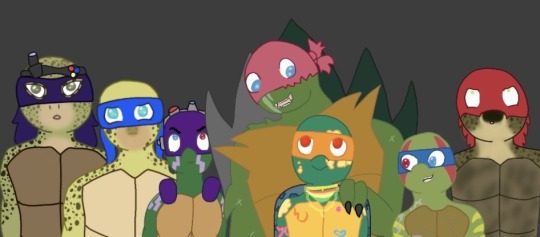
“I thought only your Leo could make rifts…” Leo said.
“Pretty cool, huh?” Leonardo asked, dancing over to stand proud at Leo’s side, “Portals are the only way into the Hidden City!”
“Hidden City?” Raph breathed through his teeth, eyes still fixed on the rift.
“Yeah!” Raphael said unhelpfully, “You three should stay close to us; the mystic types can be pretty jarring for first timers.”
Raph started to say, “I think I can handle them” before he felt a gentle tug at his hand. Raph looked to see Michelangelo holding his hand, resting his full weight against Raphael’s arm without the older mutant so much as flinching. Michelangelo’s eyes were wide, the colors flowing in them like a warm sunset as he beamed up at his friend.
“Don’t be scared, Raphie! You can hold my hand if you want to!”
“Uh…” Looking down at this tiny, vibrant young shinobi that barely came up to his stomach in height, Raph couldn’t say anything except, “Y-yeah, sure. Thanks kid…”
Michelangelo have a happy giggle and wiggled his joy. He snatched Donnie with his other hand before the tallest box turtle could get very far.
“You can hold my hand too, Donna!”
“Donna?” Raph breathed through his nose, then laughed, “Hell yeah. Down with the patriarchy.”
Donnie, upon being grabbed by Michelangelo, had much the same reaction as Raph. He didn't know what to do, and then he fell to soft adoration as he realized he would do anything for this kid.
“Thanks Mike.”
“Can I hold your hand too?” Leo asked brightly
Michelangelo’s expression flattened. “Only got two hands, Leon.”
Donatello cleared his throat and stepped forward to motion the first group through the rift. “Please keep your hands and feet inside the mystic rift until the ride has ended, keep all personals close as we will not be liable for any limbs or items that may turn up missing. Keep your shells on, your heads low, and watch out for portal jackers as we take this small voyage to Run-Of-The-Mill pizza.”
With that, Michelangelo and the two other box turtles that had to crouch to be able to hold his hand went through the rift without fear. Leo, his mouth still hanging open, turned to look at Raphael, who could only shrug before going through the rift himself.
“Lady’s first~” Leonardo gave what could have resembled a polite bow if not for the mocking tone, motioning Leo through first.
Leo sucked in a breath, shaking the nervous jitters like water off a duck's back before he stepped through. The pull was very much so like the rift he and his family had taken to wind up in this world to begin with, except less painful. When he opened his eyes again he was standing in… a restaurant?
The smell of cumin and Chili filled the air. The feeling of the polished floor under Leo’s feet was unlike anything he had ever felt before. Like ice, except not cold; soft, but hard at the same time if that was possible. His eyes adjusted to the darkness of the building and more details were quick to come to him; wooden booths with dark brown cushions and tables clean enough to shine under the candlelight that filled the restaurant; the candles, it seemed, were held up by nothing at all! They were shaped almost like they were living; Leo thought it nothing more than a cool design before he realized they actually were living! Living candles with curves and form almost like human women, their hair the flaming candle wicks and the bottom of their shafts flowing out like a ball gown! Closer still and Leo could even begin to make out tiny, detailed faces!
“You want your normal seats I presume?”
Leo blinked and shook his head as the familiar voice brought him back down to earth. Though he hadn’t seen Hueso in just over two years, the skeleton man had hardly changed at all. The calaca’s white pupils danced across the group with a curious hum.
“And shall I double your usual then?” Hueso queried.
“Bone man!” Leonardo explained, scooping Hueso up in a hug before the older yokai could make his escape. “Good to see ya!”
“Wish I could say the same.” Hueso grumbled, then added bitterly, “Problem child…”
“And that’s why you love me!” Leonardo blew a kiss, “Now Hueso, you remember the other us’s, right?”
“Unfortunately, it’s a pleasure to remake your acquaintance.”
Hueso was met with three half-hearted mutters of greeting; none of the Splintersons were even looking at him! Why would they when there were so many different creatures to see? In most every booth and table and barstool were mutants out of a fantasy book; beings even Donnie couldn’t single out as anything familiar! Some of them had characteristics that could have been compared to more natural animals— tentacles and fangs and frills. Creatures as big as an elephant or small as a shrew, with varying table sizes to accommodate all in between.
“Hey, listen bone man.” Leonardo tried to whisk Hueso away for a private conversation, but Hueso ducked to avoid the fate. His eyes and Leonardo’s were locked until Leonardo backed down, “We need a favor.”
“Don’t you always?” Hueso asked, “Seems every time you come to pay a visit it is for your own gain.”
“What? Noooo! Me? Noo!” Leonardo scoffed, waving a dismissive hand and laughing before quickly giving up the ruse, “It’s important this time. We need to find a yokai who sells decent rifts at an affordable price, and we need it like yesterday if we want to get these boys home.”
Hueso hummed, bringing his fingers to his mouth as he considered. “Define affordable.”
“Somewhere in the price range of… eight hundred US dollars or nine thousand Japanese yen.” Donatello said.
Hueso hissed through his teeth. “You won’t get any that cheap. Cheapest I know of would be Monroe, but quality rifters at his place run upward to three million pesos.”
Donatello took out his phone and ran some quick calculations. “Okay guess we’re not eating this month.”
“Wish I could be of more help pepino.” Hueso said, turning to leave while he was still talking, “I’ll go get you directions to Monroe.”
~~~
“This looks like the place…” Donatello said, and he indicated a small sliver of alleyway squeezed between two tall buildings.
“Doesn’t look like much.” Raph huffed; Michelangelo still had a tight hold on his and Donnie’s hands for support.
“But it is discrete though.” Donnie pointed out; his mind was still wandering, trying its best to soak up the tangled stimuli from the buildings and the mutants that looked almost like something out of a cartoon! Like a child had drawn these characters and these structures and planted them together in a bright, yet disorienting, array of flashing colors. “I’d hate to be an epileptic in this place…”
“Are we… gonna be able to fit through there?” Leo asked, his question directed toward Leonardo.
Leonardo flashed Leo a warning glare before saying, “Raph, are you and the guys gonna be able to fit?”
Raphael gave a low whine. His beak crinkled in concentration as his first idea was to simply walk forward, which proved him too wide. Then he huffed and turned sideways, but was still too bulky. It seemed Raphael ran out of ideas, so Donatello cleared his throat.
“If I could direct everyone’s attention slightly upwaaaard~”
Following his motion, they found what could have resembled a bell hanging above the alleyway. It looked as if it were made of slime with little chunks of something floating inside. Raph cringed at the sight of it, but Raphael gave a far too curious ooo and reached to touch it. Leonardo quickly stepped between Raphael and the slime-bell.
“No no no no, no no. No.” Leonardo said, forcing Raphael back, “Bad Raph.”
“I wasn’t gonna eat it.” Raphael pouted.
Leonardo narrowed his eyes. Raphael stuck out his bottom lip and tapped his fingers.
“Okay I was gonna eat it. You can ring it.”
“Eh… not sure if I want to…” Despite his words, Leonardo reached up and took the slimy rope of the bell, a texture not unlike a worm, and yanked on it. Instead of ringing, it gave off a sound like a foghorn blowing that made every turtle cover their ears, though Leonardo removed his hands from his head just as quickly when he realized it was still covered in slime. “Ew ew ew ew—“
There was a pop and they were swallowed by a slimy, green bubble. What followed was mixed reactions of terror and disgust as they moved into a tighter group, shell to shell with the bigger ones surrounding the smaller. The bubble lifted then off their feet and through the wall like they had no matter at all, carried past the narrow door and lowered to the ground on the other side before the slime bubble popped and left them confused and disgruntled.
“What is this place?” Donnie was the first to separate from the group to look around. The space around them was not unlike an auction house, filled with all sorts of items on display. They filled shelf after shelf after shelf, placed around with no true order. Looking up would reveal several more floors, all just as filled with artifacts and creatures for purchase, with a convenient opening through the middle of each floor.
“Looks like some sort of witchy auction place…” Raph commented. Not to be outdone by his younger brother, Raph separated and started to investigate the place for himself, “How does a grimy grifter get a place like this?”
“Wait a minute…” Leonardo frowned as he looked around, “Wait— I know this place.”
Raph picked up a gem-encrusted chalice, turning it around curiously. “Huh. Fancy.”
“Raph, don’t touch anything.” Leo groaned.
“What?” Raph scoffed, “Guess you don’t want me to do this either, huh?”
He began to juggle the chalice with surprising style.
“Raph, stop that!” Leo tried to intervene, but that only seemed to egg Raph on. He danced out of Leo’s reach, laughing as he pretended to drop the decor before catching it at the last second, “I’m serious!”
Raph only laughed. At least, he was laughing until he actually did drop it— right on the head of a small, purple yokai who had been observing the scene, as still as one of his statues. Raph swore, trying to recover the drop but it was too late. It sank into the yokai’s head as if he were made of pure gelatin, and they could still see the gold through the flesh and skin. The purple yokai blinked, and Raph screamed.
The purple yokai’s skin shifted into flowing rings of yellow and orange that forced the chalice up and out of his head, into his hand. He didn't look like much— something akin to a slug if anything— with a soft beak and a snaggle tooth like Raphael’s only smaller. He breathed onto the chalice and wiped it off with his sleeve before placing it back on the shelf.
“Please don’t touch.”
“YOU!” Leonardo pointed accusingly, “You’re that slug guy who sold me wallet-stealing hair! You’re Monroe?!”
“That’s a talking slug—” Raph withdrew back into the crowd of his brothers, eyes wide.
Donnie gasped, pulling his goggles down over his eyes and advancing as quickly as Raph had retreated. The slug drew into himself, his entire body constricting like a squeezed stress ball. Leo visibly cringed, while Raphael and his brothers didn't seem all that bothered beyond a few yawns or comforting pats for Raph.
“This is incredible— there’s compounds in him that fail to be isolated or traced!” Donnie picked up one of the slugs arms to investigate every inch of him. “He doesn’t even seem to be carbon based at all; there’s elements I can’t even identify— what…?” Donnie pulled up his goggles as the astonishment gave way to a confused frown, “Is— is he a mutant?”
“No.” Donatello scoffed.
That was met with three very confused box turtles casting side glances.
“Are… are any of them mutants?” Leo asked.
Leonardo laughed, “What? You though every yokai in the Hidden City was mutated by Draxum and his army of mutant mosquitoes? Ha! W-what dumb idiots would think that?” Leonardo was visibly sweating.
“Not these dumb idiots, that’s for sure.” Donatello tried to brush past, scratching his neck.
“W-wait, so none’a them guys we passed were mutants?” Raph asked, pointing back at the door.
“Well, some of them might have been, but the majority? No; they’re yokai and cryptids.”
“Yokai…” Donnie breathed, and that astonished look returned to his face as he continued to circle Monroe, “They exist in your world? Oh my kama this just keeps getting better—“
“Don.” Raph whistled as if Donnie was a dog, “Buy first, geek later.”
Monroe’s eyes lit up at that and he pulled himself away from Donnie to give a polite bow to the rest of the group. “If sales you wants, sales I’s gots! I gots artifacts from all around the world, from the tombs of Giza to the ancient Amazons. If you needs it, I gots it!”
“Great!” Raphael clapped. “Cause we need a high quality rifter.”
Monroe sank into himself. “Not that’s I don’t gots…”
A visible vein twitched in Leo. “What?”
“I solds out…” He frowned, tapping his nubby hands together.
“WHEN?”
“Like ten minutes ago, don’t yell at me.” The slug quivered, his eyes like saucers.
Leonardo sucked in a slow, deep breath, “Who bought them, Monroe?”
“Oh, an andoroido with a nice voice ands such manners. He’s having buying all my rifters. He’s very rich.”
“All of them?” Raphael whimpered, “Y-you don’t even got a… a small busted one in the back?”
Monroe shook his head. “Not one! He was be very insistent he gets alls of them. But I do has a very special hover pod with your name witten all over it if you—“
“Not interested.” Leonardo quickly dismissed, pulling on his face in his frustration, “Great. We— we’ll find somewhere else to look.”
“But I is to be assuring you that no other shop has rifters worth your while…” Monroe said.
“That's what every illegal rifter peddler would say!”
“Not this illegal rifter peddler, I swearing it to you!”
“And I swear I’ll bust your teeth in if you’re lying…” Leonardo seized Monroe by the collar and lifted him up.
“Leo.” Raphael was quick to correct. His eyes met Leonardo’s for just a moment. That was all it took for Leonardo to relent and release the Yokai. Raphael made a quick point to help Monroe fix his shirt. “Sorry ‘bout that. If you happen to find a rifter you missed, could you give us a call?”
Without having to be asked, Donatello had already written up his phone number and placed it in Monroe’s hand.
“You wouldn’t happen to have any more contacts, do you Don?”
Donatello took a long, slow breath. “I’ll see what I can find.”
19 notes
·
View notes
Text
The Scarlet Letter: Let’s talk about RWBY’s male LGBT rep
I have been sitting on this post for nearly four weeks waiting until the 15th due to the Before the Dawn spoiler rules.
So let's start with a blunt statement: RWBY's male LGBT representation has not been good. If the series' handling of female LGBT rep is good (which... well there's worse shows) and the general standard for how you write LGBT characters in a show like this, its handling of male rep has been... how not to. And Before the Dawn kinda solidified the idea in my head that the show's handling of its male LGBT cast just isn't good enough, either by the standards of when RWBY began in 2013, or today in 2020 when compatively massive steps have been taken over the past decade to show a more diverse list of characters... or at least a more diverse list of female characters.
I don't wanna make this a pissing match over how over-or-under-represented male or female LGBT characters are, but I feel like it's safe to say that the majority of the trend-setters for modern romances, especially in western animation, have been between women. Korra and Asami from Korra, Chloe and Max from Life is Strange, Marceline and Bubblegum in Adventure Time, (insert the relevant Steven Universe characters here, never watched it), and more recently, Adora and Catra in She-Ra and Luz in Owl House.
Compatively, while studies have shown that in general male LGBT characters get more appearances on a purely numerical level, in general they're more one-off characters there to pad a roster, or played more for comedy (see Josh Gad in the Beauty and the Beast remake or the gay guy in Avengers Endgame that was more notable for how hard China and Russia snapped him out of existance). The only big male-LGBT focused media I can think of from the last decade would be Yuri On Ice, Moonlight, IDW's Transformers: More Than Meets The Eye (Chromedome/Rewind best pairing fuck you Roberts for issue 16) Love Simon, and the anime adaptation of Banana Fish.
So it's no surprise that RWBY basically follows these ideas. It's big romance is (unless the writers are very stupid) going to be between Blake and Yang, their first out character was Ilia, Coco got sent to the Book Dimension where she confirmed "I use my sunglasses to perv on women without their knowledge" which uh... yeah you can definitely tell RWBY is written by men... and Volume 6 had Saph and Terra being a good example of an LGBT couple without any real drama. In the last three years alone, the show has drastically increased its lesbian and bisexual characters, alongside even including its first out trans character in May Marigold (albeit only revealed on Twitter). In general, these depictions of sexuality have been pretty OK. Would have liked it if Ilia wasn't immediately written out of the show after Volume 5 as it made her feel a bit more disposable than intended but whatever, subject for another day.
RWBY's male rep though is a bit spottier. There's the plant bois in Volume 5's premiere, we nearly had Pilot Boi until some last-minute revisions, and... Scarlet.
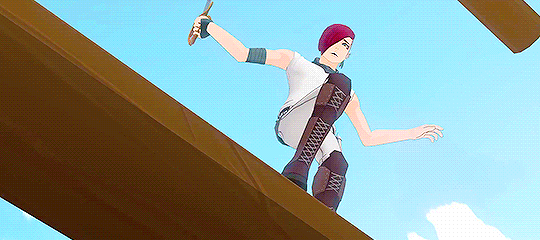
Why Scarlet's a bad launchpad for male LGBT rep
I don't like Scarlet or how his sexuality has been handled. Scarlet's homosexuality wasn't revealed in the show, or by the writers, or even in anything that's actually canon. He's confirmed gay in his sole of dialogue in a non-canon fan anthology, where the manga's Twitter team had to say that Miles suggested the idea and approved of it.
In short, Scarlet is Dumbledore'd, where his sexuality is revealed in out-of-show material and in a way that doesn't make it supremely obvious (Miles himself never commented to confirm this so this news was limited in how far it could spread. I'm genuinely curious how many people still don't know Scarlet's gay), and Scarlet himself is a nothing character who was written out of the show after Volume 3 and only reappeared in Before The Dawn, half a decade after he vanished. Compared to Ilia, as this came out after Ilia's entire arc in Volume 5, it's not a great starting point for mlm rep. But things would have been forgiven if it had gotten better, if the show did have more male LGBT characters introduced, even just on the Saphron/Terra level of just being around for a few episodes before leaving. Then it would have been a misfire but then we could all say "Things got better."
It... didn't. Which is why when Before the Dawn released in 2020, a full two years after Scarlet was first confirmed gay, while the franchise had more than doubled its wlw rep, Scarlet remained the one male character in the entire franchise who had a name and liked men. I remember vividly a fake leak for After The Fall which claimed Yatsuhashi would come out to Velvet and admit to having a crush on Fox. And I remember as well how many people were disappointed when it was said to be false, because it would have been nice for Yatsuhashi's character, especially after the fleshing out he gets in the CFVY books. If Yatsu had come out as gay in the books I'd like his writing enough to say he's a good case for rep, albeit with the caveat of "This is all in side material." But in reality, the leak was fake and Coco was confirmed gay instead.
Unfortunately, Before the Dawn proceeded to ruin Scarlet and made me at times feel genuinely uncomfortable as a queer man! Let's talk about that.
Before The Dawn is crap and Scarlet's writing is borderline offensive
I hate Before the Dawn. It's... bad. I read it while on a vacation and the only solace I had about the entire thing was that I'd bought an M&M chocolate bar. The bar was finished before the book. That bummed me out. It's not a very well written book, the prose is very Early 2010s YA Writer, none of the characters are memorable and there's various Fun Incidents like "NGDO using children as bait for Grimm," and "Neptune's hydrophpobia being used as a threat to torture him and the scene is played for comedy."
Theo was cool. I can't wait to see him as written by good writers, he should be a highlight of the Vacuo arc.
I had two hopes for Before the Dawn- "Don't be bad," and "Let Scarlet and Sage be well written." I'd liked how After The Fall had handled some of its characters (barring, y'know, Coco perving on women), especially Fox and Yatsu who were surprising in how much I liked them. I was looking forward to seeing Myers give Sage and Scarlet similar treatment- two relatively nothing characters meant he'd have a blank slate to write them however he wanted, he could give them unique personalties and if nothing else it could be cool to see their Semblances.
And then I read the book. (Sage fans I am so sorry for you, you got baited harder than Johnlock fans)
Scarlet's a giant dickhead in the book. It's his sole character trait and his inner monologues go on, and on, and on about how much he hates Sun, how he revels in mocking him. Most of his dialogue is sarcastic put-downs about Sun and how lame he is, and Sun is never properly allowed to defend himself or point out how going with Blake meant he was able to help save Haven Academy.
(hey remember when Sun in Volume 6 expressly says to Blake "I was a bad leader for ditching Neptune and the others, and I need to work on that" only for Before the Dawn to have him staunchly refuse to accept that he let the team down? I don't think Myers did but I do)
Scarlet being a ratty bitch would be one thing if, again, the franchise had done more rep. He'd still be a badly written character, but it wouldn't sting as much. But because Scarlet is still the only expressly confirmed male LGBT character in canon (the book teases that Nolan is gay but there's never confirmation either way beyond him smiling at Scarlet), it means that he has to represent that entire ideal. So when the one gay man in Remnant is being an asshole and a snide loser, that means that by extension, this is how the franchise sees gay men. And that fucking sucks! I wanted to come out of Before The Dawn singing its praises, I wanted to like the book, but it was a massive letdown, especially coming off of the other big 2020 RWBY controversy involving gay characters.
Yeah. We're doing this.
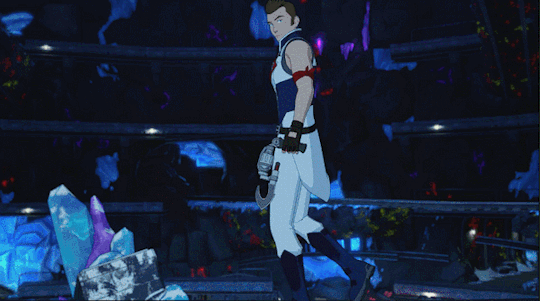
Clover and Fair Game: Technically not queerbaiting. BUT:
Let's pre-empt this: Clover wasn't queerbaiting, and Fair Game, while cool and I dig it, kudos to them for becoming one of the top 5 RWBY pairings on AO3 in one year that's fucking impressive (I say with mild malice as an IronQrow main), never had a chance. The writing never seriously boosted it barring one interaction which was flirty (them talking in the lobby of the Schnee Manor), and everything else was out of show boosting through the social media teams and CRWBY hyping it themselves by saying they liked it. If you wanna blame people, blame the animators who went off-script with stuff like Kim Newman adding the wink as a deliberate nod to the Volume 4 waitress, or the social media team deliberately using the same policies for Fair Game as they do for Renora and Bumblebee.

It wasn't Eddy's fault that things escalated, and he himself has said that in retrospect, he should have warned people that this never had a shot.
But I can't blame the Fair Game fanbase. Because Fair Game took off like wildfire. It came right as the fanbase began seriously asking for more male rep, Qrow's pretty hot, and the Clover wink came right after the Great IronQrow Reawakening of November 9th, 2019. The rocket was primed, and they rode it to the moon. Finally, to these people, after seven years RWBY seemed to be doing something with mlm rep in show. People started getting into RWBY just for Clover and Qrow's interactions. And if heroes were boring, Watts and Tyrian also had a fantastic dynamic that made Nuts and Volts one of the more popular villain ships overnight. Things seemed to be turning around! RWBY was remembering that gay men existed! You could hear the choir sing!
... And for those people, that meant that episode 12 hit like Truck-Kun.
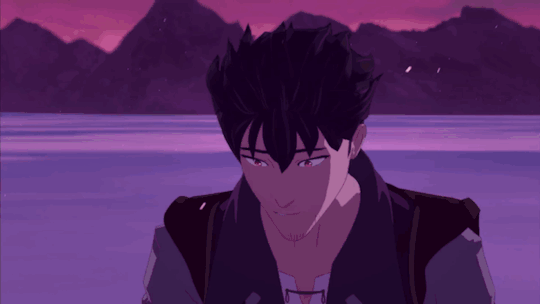
People got pissed. People were horrified. And it didn't help that some members of CRWBY had said in the build-up that episode 12 would have some shots that made them nauseous (probably the Tyrian thumb thing) Out of context, it looked to these fans like CRWBY were basically laughing at their suffering, like they were saying "Lol, you thought you had a chance, get fucked, I hope your vomit burns on the way up."
Yeah, Fair Game was never gonna be canon, and I think some people ran too far with it. But in the wider context of how desperate RWBY's mlm community had gotten for basic crumbs of content? I can see why they'd run with what they had. The writers aren't at fault for what happened, but CRWBY didn't help matters. And that desperate mix of what felt like official backing from the crew, jokes about how cute the ship was, and the hope that finally the show would have onscreen rep? I can see why people ran with it.
So why is the show more lackluster in depicting mlm characters?
Money. Let's be honest, most RWBY fans don't care if the show doesn't have good male rep. I'm willing to bet some of you reading this won't care and just dismiss it as not being that big a problem. I don't think the writers care if the show doesn't have good mlm rep because they're not poaching that market. They're after what they see as a bigger, more lucrative market, which in this case is female LGBT rep. That gets people buying games, watching shows, raising awareness and boosting awareness of your property, which means you make more money. In short: Two women kissing hits more markets and generates more attention than two men.
Am I saying that Miles, Monty and Kerry deliberately sat down seven years ago and said "We're not doing gay men because it won't generate enough ad revenue and traffic to be worth the loss in revenue from homophobes?" No, that's silly. But I'm saying that it's less important for them, and it shows in the things that are small and add up. Things like Miles not verifying Scarlet's sexuality or retweeting the manga account's confirmation to spread the message (compared to how he enthusiastically confirmed Ilia being a lesbian himself during the Reddit AMA). It shows in how Pilot Boi would have been the first mlm character only to die in his second full episode until M&K were told about the Bury Your Gays trope. It shows in how Shannon believes that Ozma is "megaqueer" and Miles jokingly laughs it off instead of confirming it, leaving it to just be Shannon's headcanon. It shows in how actor shipping is compared between the mlm and wlw ships, where Arryn and Barbara's frequent pushes for Bumblebee are seen as "official confirmation that it's endgame" while Michael and Kerry saying they enjoy Seamonkeys is treated as "well it would be cute if they did it, but they're never going to."
I'm not gonna say anything like "CRWBY are gonna have Qrow end up with a woman like Robyn out of spite against the bad apples of the Fair Game crowd." I'm not gonna say that I don't think CRWBY cares about male representation in the series. It is, however, definitely a low priority for them, and because that leads to gaffes like Scarlet's writing in Before The Dawn being offensive in his depiction, it only makes the contrast between the sexes all the more painfully apparent.
I'm kinda tired of waiting for Rooster Teeth to show that they do care about mlm. I'm kinda tired of RWBY's male rep being written like it came from a 1993 time capsule where I have to enhance the screen to see a guy holding a sign of Sun's abs or be content with the only onscreen rep still being the plant bois in Volume 5. I'm tired of how often the crew dances around answering basic questions about sexuality (and age, and birthdays, and heights, and so on) by treating it as a spoiler question, as if just wanting to know what way people swing would ever be a spoiler. I'm just... tired of all this. When the best mlm rep in Rooster Teeth's history remains the two dads in Camp Camp who show up in a few episodes, that should say something really bad about your company and your biases (To say nothing of the recent Red vs Blue seasons and their blatant queerbaiting for Grif and Simmons and the whole can of worms that is Donut).
I'd like to not feel like I'm borderline unwelcome because I'd like to see two men in this show kiss, and that the sole thing that represents people like me in this show is some British twat who complains about sand.
I'd just like to feel like my sexuality isn't a joke to Rooster Teeth (or at the very least, be like Donut and have it be a funny one). But at this point after the last few years? I feel like a very uncomfortable punchline to them. And it just sucks.
#rwby#rwde#fair game#queerbaiting#rwby before the dawn#mlm#lgbt#rwby analysis#Rooster Teeth#clover ebi#scarlet david
97 notes
·
View notes
Text
2020 Art Summary
Yep, it’s 2021 already. 2020 is finally over. It felt like it lasted forever, and it felt like the end would never come, but here we are. Crazy how the time flew by.
I felt like I didn’t get much art done this year because of Current World Event, but I made a lot more than I thought I did. Even some of my new favorite pieces came out of this year, so I think that’s worth celebrating and looking back upon!
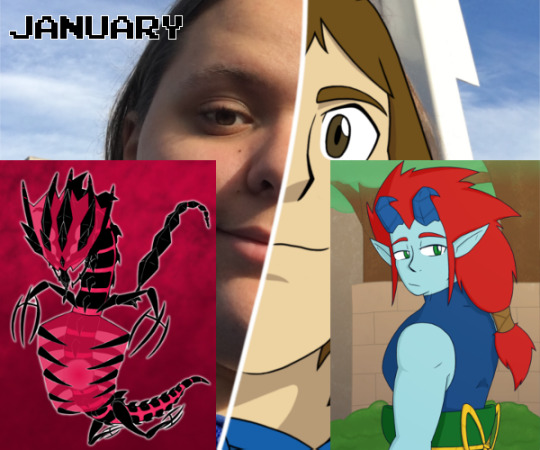
I was insanely productive during the first month of 2020, and looking back I was surprised at all the stuff I did, but then I remembered that that winter season was actually one of the best times of my life! I started being more socially involved, and I think my newfound drive at the time translated into all the art I pumped out this month. This is just a small fraction of what I made in January, but I only have so much space. Quite a few complex pieces in both style exploration and polishing my own style.
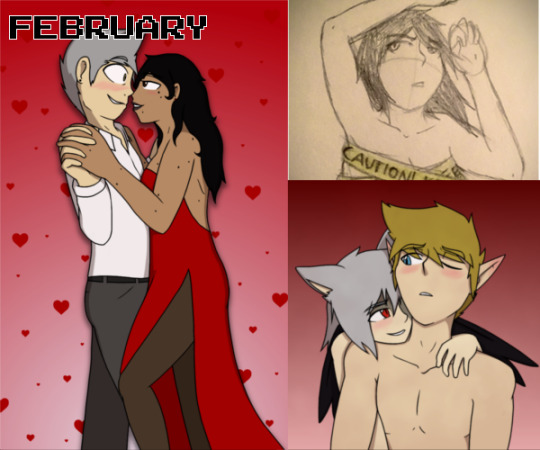
Apparently February was a rather intimate month. Things began to slow down in terms of my own art here, with me spending more time in social settings and school work ramping up, I didn’t have as much time to coop up in my room to draw. I did wanna do something for a friend’s Valentine’s Day OC art challenge, so I drew my lovey-dovey couple from Dance of 1000 Words havin’ a dance. Nothing actually came of that challenge, but it was fun to do regardless.
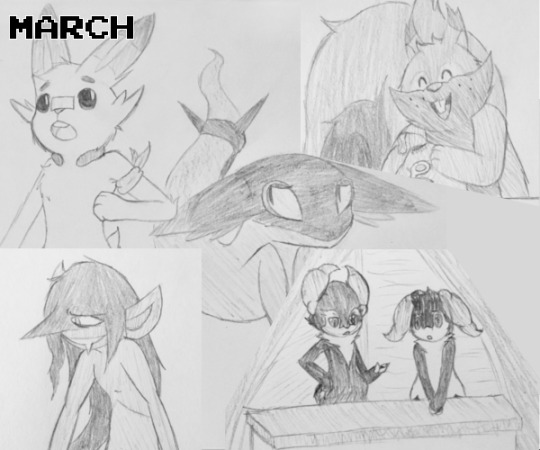
One of the things I was most proud of in the winter season was making more friends, and one of the closest friends I made was completely coincidental. I met a person named Kiri on the bus one night I decided to volunteer somewhere by myself, and we ended up chatting and getting along. They quickly told me their tumblr username, and I shot them a message immediately after they left. A couple days later, we met up for brunch, and we started becoming really close friends and creative partners!
Not much else happened in March cuz that’s when Current World Event started becoming an issue, but Kiri and I still kept in close touch and we randomly started developing a concept for a Pokemon Mystery Dungeon: Galar Edition. These are a handful of characters we thought up, with Skipper the Scorbunny and Dross the Dreepy as the main characters, Morgrem as the main antagonist, and some shopkeepers such as those of the Greedent Bank and the Indeedee General Store. This was also my first time drawing all of these Galar Pokemon (except Scorbunny, but I also made Skipper a bit more unique than a regular Scorbunny).

Lots of events happened this month. First of all, Steven Universe Future ended, one of my favorite and most influential shows was no longer continuing. I had to do something as tribute, both as a send-off to one of the greatest cartoons in the world and as a cathartic release for my feelings towards it.
A while later, I got the opportunity to start playing an MMO in beta called Fer.al, by the same people who made Animal Jam, which coincidentally I had also beta tested for back in the day. I ended up getting really attached to my first character, a Senri I named Sasha, and though I’ve made more characters than them since, they’re still my absolute favorite. Though I haven’t touched the game in a few months, I was really engrossed for a long time and enjoyed playing through the beta and early access phases.
At the end of the month, some friends of mine invited to a roleplay group with some mutuals, and we all played characters in a crime syndicate. Just a bunch of ragtag thieves and criminals who ended up together in order to protect an artifact called the Crown of Thieves, which was essentially a flag to be taken by other groups to prove that they are the best thieves in the land. My character was based heavily on my sona (if it wasn’t obvious) and was also influenced by Cloud Strife, since the FFVII Remake had just come out and I was super into watching the cutscenes at the time. My character’s (code)name is Valkyrie, and they are a mercenary, going between multiple different employers to carry out whatever duties they need to do. They have a more complicated backstory, but presently they were recently hired by recommendation of their friend Shark (played by @shmoots-universe who is also My friend now ily maya) who works with a group called the Court Cards who are currently in possession of the Crown of Thieves. Valk never really had a place to call home, but staying with this group of people had to be the closest they could get to that feeling.
They still sleep with a knife under their pillow because of trust issue but that’s okay.
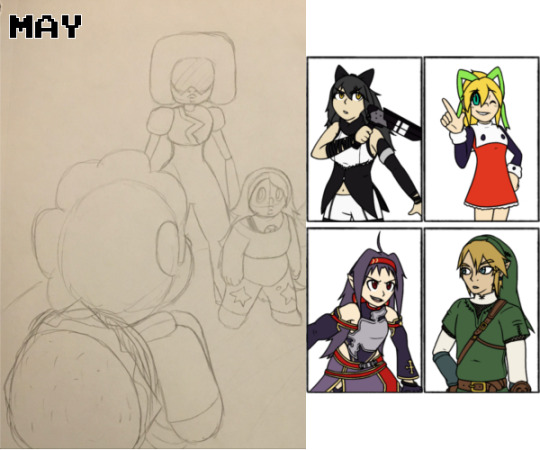
Okay, so technically these examples started in April, but I continued making content with them in May, and the month was just pretty void of art in general, so here I am addressing them.
There were two main things I worked on this month: a Steven Universe AU of my own and the whole #sixfanarts thing that kicked off around then. Let’s start with the fanart bits. I did two and a half of them (six in April and nine in May), and it was so much fun to be able to draw stuff I don’t normally do! My personal favorites are shown here: Blake Belladonna from RWBY, Roll from Megaman, Yuki Konno from Sword Art Online, and Link from The Legend of Zelda: Twilight Princess.
The other thing I’d been planning for a while was a Steven Universe AU, probably to cope with the show being over but also because I was inspired by a lot of those SU AU artists I started following at the time. I won’t share the details here because it’s gonna have its own blog at some point, but the example I’ve shown here is of a comic I made loosely in order to introduce a divergence in the plot of the story as well as introduce a character unique to my AU. It was a lot of fun figuring out how to draw the characters and get a feel for the style.

As the year progressed, my amount of art I made per month began to dwindle, this time mostly because school was kicking my ass especially hard with finals. However, I took what time I had to get some backburner pieces finished, like the Tigerlily picture which I sketched out a couple months back, and the Gunvolt picture which I started working on SIX YEARS AGO. I don’t quite know why I got the urge to work on it again after so long, but it was nice to finally realize. The other drawing for DOTS was done in the dead of night but I was really happy with how it came out.
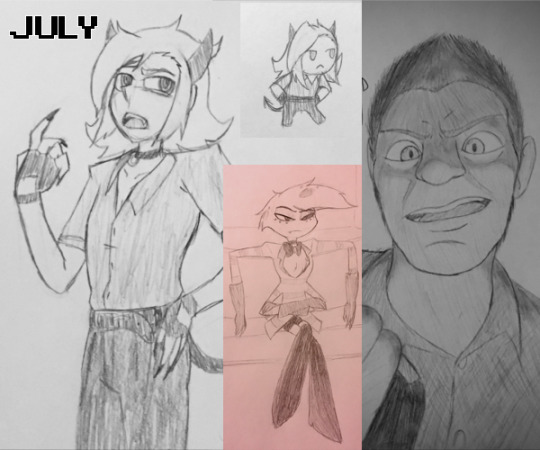
Despite only having two summer classes left of school, this month was really rough because they demanded a lot of my time and attention. I did not have the gumption to do anything digital, so I stuck to my sketchbook to get out what I felt like getting out.
My friends and I did a stream of the game Helltaker, and I really enjoyed the concept, so in following my friends I made my own Helltaker demon OC named Raksha the Ravenous Demon (it’s a pun but also got mythical insp). I also got super into Hazbin Hotel at this point, mostly because the Addict music video dropped and I couldn’t get enough of it, so I doodled Angel Dust cuz I felt like it.
The other drawing I did was actually a free commission I gave a friend of mine as a prize for a trivia game show I ran back in June. He along with a couple other friends got some free drawings from me for getting the top three scores, and this one in particular was fun because of how interesting it was. He wanted me to draw a video game reviewer called the Irate Gamer from a specific moment, and I decided to go ham and just make it as dramatic as possible.
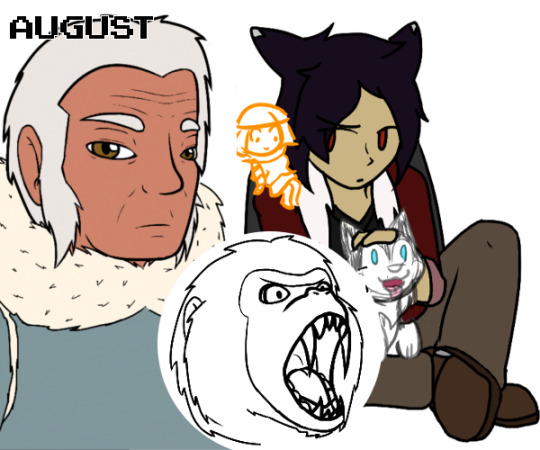
University classes finally wrapped up and right after that I was in the process of moving out of my apartment and getting adjusted to living with my parents again. I did a couple of agg.io drawing sessions with my friends from the Court Cards group as well as a new Dungeons and Dragons homebrew group I had joined. I drew some more of Valkyrie and came up with a design for my DND character Qakuqtuq (or Kai for short). He is monkey grandpa and I love him.
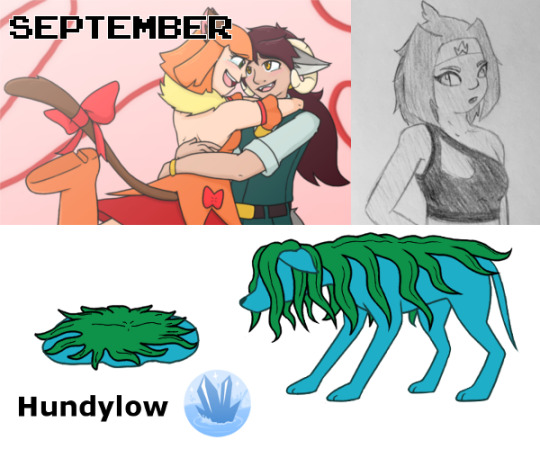
My main focus was on finishing a polished piece for my friend Cake, whose birthday was in the upcoming month. I wanted it to be as amazing as possible, so I put a lot of time into getting more detailed and making them look good. In addition to that, I did a few TOME doodles just for fun. The creature on the bottom was for this month’s art challenge on my Discord server where we made original TOMERPG monsters, and I created Hundylow, a Crystal-element monster based on the Grindylow from English folklore.
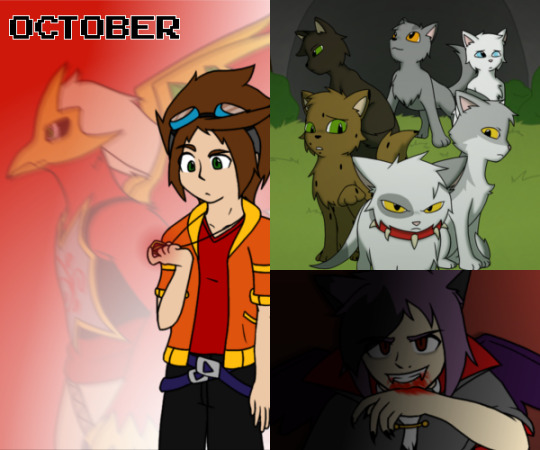
This month was a lot more productive than the past few had been. I tried to do a 31-day art challenge called Creatober but failed to get past the third prompt because I was still swamped with other work. I’m still happy with what little I did, including the piece with my characters Kyle and Guarudan from DSWD.
I don’t remember how, but I also suddenly rediscovered an old Flipnote Hatena series called Tales of LostClan, a Warriors fan series that I would say was the most obscure thing I’ve ever been super invested in. It was what got me into the actual Warriors books, and I liked it so much I redrew the animations into a comic... twice. Didn’t get nearly as far the second time but clearly my love for this little fanfiction had not waned after nearly a decade. I felt like drawing a book cover/movie poster for the series, just to get it out there and see how much I’ve improved over all that time.
Also I felt like making a vampiresona just before Halloween because I never dress up for Halloween in art (or real life anymore, for that matter), and I wanted to do something like that for once. It was short-lived but I really liked the design!
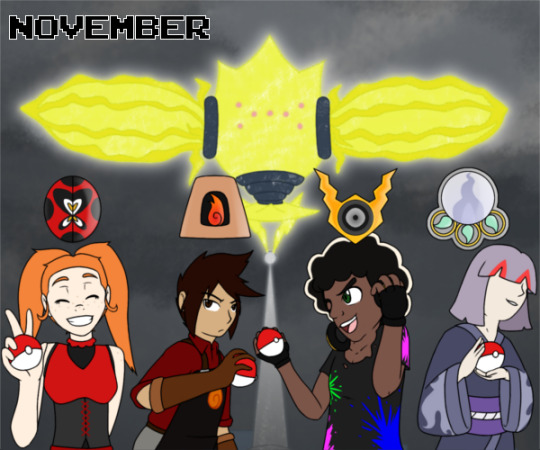
The focus of this month was definitely on Pokemon stuff. As per usual I contributed to the current Gotta Draw ‘Em All collab, and I was tasked to draw Regieleki. It was really fun to figure out how to make it stand out and look like it was made of electricity.
I also committed a lot of my spare time to my Fakemon Gym Leaders, as I had been working on bringing them to life in the past year or so now. As of this post, I’ve finished rendering their full body poses and gym badges, but I’m still working on completing all eight VS portraits, the first half of which are shown here.

I... didn’t draw anything this month, actually. What I’m showing here was worked on in the last few days but has actually been in progress for a couple of months, and I just finished it earlier today, in 2021. But I needed to show something off, and it’s also about time I mentioned it.
Back in October, I kept seeing people rave about this game called Genshin Impact, and I was interested but not so much as to start playing it... until my friends started playing and I was like “fuck it, let’s download it”. Since that day, I have been super immersed and in love with this game, to the point I came up with my own canon based on my gameplay experiences. This also included the creation of an original player character: Astra, the non-binary Traveller. And now, I’ve finally drawn them and brought them to life.
It has been one hell of a year. I had some of the highest highs and lowest lows in 2020, lots of changes, and I have now officially moved onto the next chapter of my life now that my time at university is finally over. I’m very excited for what 2021 has to offer, and I’m going to go forward with great ambition.
#my art stuff#art summary#this is always a joy to do every year and i'm glad to keep up the tradition for the sixth year in a row#this year was super good for this as well just to look back on what i was actually able to accomplish#long post#tome#hazbin hotel
10 notes
·
View notes
Note
Talk about tijan please. You now officially have the chance to!
(also tbh I always love your replies and I don't think that you ever glorify remakes over skam i quote or rather paraphrase 'skam S3 is almost perfect TV' or something like that. But well. What do I know)
Hi anon 🎨 Sure lol.
I think Tijan is a really sweet girl. She’s always hyping up other women on her ig, which seems like such a low bar, but when we first came across her social media, I was really struck by how much homegirl just loves women. (I thought she might be wlw based on this alone, even! But if she is, she hasn’t come out where I could see. :P) I also think she has an eye for photography. A lot of Milena stans actually use pics Tijan has taken for their icons.
I also think she has a lot of chemistry with Milena. I’m not sure if Victoria would’ve read as a LI if it weren’t for the way Milena and Tijan play off each other tbh. I feel like if someone else had played Victoria, she’d have come off as more of a foil for Mia (loves summer while Mia’s last name is Winter, follows her pussy where Mia follows her brain, etc). What I’m trying to say is that Tijan has wild sapphic energy, in the same way Hajar has wild sapphic energy even if the characters aren’t necessarily wlw themselves.
Honestly, I think Milena had more chemistry with Tijan than with Chris lol.
And I also think it’s so interesting that Tijan is of Circassian descent. I had never really heard of Circassian people before, and so when I looked into her and found about them, I learned something! There was a Circassian genocide in the 19th century and for well over two decades they were part of the UNPO (Unrepresented Nations and Peoples Organization), although they’re not anymore.
In a world where Druck would’ve continued making seasons about gen 1, I honestly wouldn’t have minded seeing Victoria again. I’m not sure how it’d have worked though, because she didn’t look high school age to me (Tijan was born in 1996), and people would kill the writers if they’d made a second Mia season or a season where Mia was the LI. And outside of Mia, Victoria had really little reason to be on the show.
As for the anon. I think it was a bit surprising for them that I came in so hard lol. I mean, it’s my whole thing, but surprising if you don’t know me from any other user lol. It’s obvious they weren’t really familiar with my positions, because like you said, I’m very positive about Isak’s season, I love it and defend it, and I still think it’s the best s3 overall. It’s funny because I actually enjoyed Isak’s season (or Matteo’s season while we’re at it) more than Fatou’s season, the season that according to anon has quantity AND quality, but I don’t go to Flora (or anyone else) to ask why she prefers large amounts of mediocrity over the outstanding cis white mlm season.
4 notes
·
View notes
Note
Zombie symbolism in media? Body snatchers? That sounds extremely interesting 👀👀👀
OOOOOOOOOOH ARE YOU READY FOR ME TO RANT? CUZ I’M GONNA RANT BABY. YALL WANNA SEE HOW HARD I CAN HYPERFIXATE???
I’ll leave my ramblings under the cut.
The Bodysnatchers thing is a bit quicker to explain so I’ll start with that. Basically, Invasion of the Body Snatchers was released in 1956, about a small town where the people are slowly but surely replaced and replicated by emotionless hivemind pod aliens. It was a pretty obvious metaphor for the red scare and America’s fear of the ‘growing threat of communism’ invading their society. A communist could look like anyone and be anyone, after all.
Naturally, the bodysnatcher concept got rebooted a few times - Invasion of the Bodysnatchers (1978), Body Snatchers (1993), and The Invasion (2007), just off the top of my head. You’re all probably very familiar with the core concept: people are slowly being replaced by foreign duplicates.
But while the monster has remained roughly the same, the theme has not. In earlier renditions, Bodysnatchers symbolized communism. But in later renditions, the narratives shifted to symbolize freedom of expression and individualism - that is, people’s ability to express and think for themselves being taken away. That’s because freedom of thought/individuality is a much more pressing threat on our minds in the current climate. Most people aren’t scared of communists anymore, but we are scared of having our free will taken away from us.
The best indicator of the era in which a story is created is its villain. Stories written circa 9/11 have villains that are foreign, because foreign terrorism was a big fear in the early 2000s. In the past, villains were black people, because white people were racist (and still are, but more blatantly so in the past).
Alright, now for the fun part.
ZOMBIES
Although the concept has existed in Haitian voodooism for ages, the first instance of zombies in western fiction was a book called The Magic Island written by William Seabrook in 1929. Basically ol Seabrook took a trip to Haiti and saw all the slaves acting tired and ‘brutish’ and, having learned about the voodoo ‘zombi’, believed the slaves were zombies, and thus put them in his book.
The first zombie story in film was actually an adaptation of Seabrook’s accounts, called White Zombie (1932). It was about a couple who takes a trip to Haiti, only for the woman to be turned into a zombie and enchanted into being a Haitian’s romantic slave. SUPER racist, if you couldn’t tell, but not only does it reflect the state of entertainment of the era - Dracula and Frankenstein had both been released around the same time - but it also reflects American cultural fears. That is, the fear of white people losing their authoritative control over the world. White fright.
Naturally, the box office success of White Zombie inspired a whole bunch of other remakes and spinoffs in the newly minted zombie genre, most of them taking a similar Haitian voodoo approach. Within a decade, zombies had grown from an obscure bit of Haitian lore to a fully integrated part of American pop culture. Movies, songs, books, cocktails, etc.
But this was also a time for WWII to roll around and, much like the Bodysnatchers, zombie symbolism evolved to fit the times. Now zombies experienced a shift from white fright and ethnic spirituality to something a bit more secular. Now they were a product of foreign science created to perpetuate warmongering schemes. In King of Zombies (1941), a spy uses zombies to try and force a US Admiral to share his secrets. And Steve Sekely’s Revenge of the Zombies (1943) became the first instance of Nazi zombies.
Then came the atom bomb, and once more zombie symbolism shifted to fears of radiation and communism. The most on-the-nose example of this is Creature With the Atom Brain (1955).
Then came the Vietnam War, and people started fearing an uncontrollable, unconscionable military. In Night of the Living Dead (1968), zombies were caused by radiation from a space probe, combining both nuclear and space-race motifs, as well as a harsh government that would cause you just as much problems as the zombies. One could argue that the zombies in the Living Dead series represent military soldiers, or more likely the military-industrial complex as a whole, which is presented as mindless in its pursuit of violence.
The Living Dead series also introduced a new mainstay to the genre: guns. Military stuff. Fighting. Battle. And that became a major milestone in the evolution of zombie representation in media. This was only exacerbated by the political climate of the time. In the latter half of the 20th century, there were a lot of wars. Vietnam, Korea, Arab Spring, Bay of Pigs, America’s various invasions and attacks on Middle Eastern nations, etc. Naturally the public were concerned by all this fighting, and the nature of zombie fiction very much evolved to match this.
But the late 1900s weren’t just a place of war. They were also a place of increasing economic disparity and inequal wealth distribution. In the 70s and 80s, the wage gap widened astronomically, while consumerism remained steadily on the rise. And so, zombies symbolized something else: late-stage capitalism. Specifically, capitalist consumption - mindless consumption. For example, in Dawn of the Dead (1978), zombies attack a mall, and with it the hedonistic lifestyles of the people taking refuge there. This iteration props up zombies as the consumers, and it is their mindless consumption that causes the fall of the very system they were overindulging in.
Then there was the AIDS scare, and the zombie threat evolved to match something that we can all vibe with here in the time of COVID: contagion. Now the zombie condition was something you could get infected with and turn into. In a video game called Resident Evil (1996), the main antagonist was a pharmaceutical company called the Umbrella Corporation that’s been experimenting with viruses and bio-warfare. In 28 Days Later (2002), viral apes escape a research lab and infect an unsuspecting public.
Nowadays, zombies are a means of expressing our contemporary fears of apocalypse. It’s no secret that the world has been on the brink for a while now, and everyone is waiting with bated breath for the other shoe to drop. Post-apocalypse zombie movies act as simultaneous male power fantasy, expression of contemporary cynicism, an expression of war sentiments, and a product of the zombie’s storied symbolic history. People are no longer able to trust the government, and in many ways people have a hard time trusting each other, and this manifests as an every-man-for-himself survivalist narrative.
So why have zombies endured for so long, despite changing so much? Why are we so fascinated by them? Well, many say that it’s because zombies are a way for us to express our fears of apocalypse. Communism, radiation, contagion - these are all threats to the country’s wellbeing. Some might even say that zombies represent a threat to conversative America/white nationalism, what with the inclusion of voodooism, foreign entities, and late-stage capitalism being viewed as enemies.
Personally, I might partly agree with the conservative America thing, but I don’t think zombies exist to project our fears onto. That’s just how villains and monsters work in general. In fiction, the conflict’s stakes don’t hit home unless the villain is intimidating. The hero has to fight something scary for us to be invested in their struggles. But the definition of what makes something scary is different for every different generation and social group. Maybe that scary thing is foreign invaders, or illness, or losing a loved one, or a government takeover. As such, the stories of that era mold to fit the fears of that era. It’s why we see so many government conspiracy thrillers right now; it’s because we’re all afraid of the government and what it can do to us.
So if projecting societal fears onto the story’s villain is a commonplace practice, then what makes zombies so special? Why have they lasted so long and so prevalently? I would argue it’s because the concept of a zombie, at its core, plays at a long-standing American ideal: freedom.
Why did people migrate to the New World? Religious freedom. Why did we start the Revolutionary War and become our own country? Freedom from England’s authority. Why was the Civil War a thing? The south wanted freedom from the north - and in a remarkable display of irony, they wanted to use that freedom to oppress black people. Why are we so obsessed with capitalism? Economic freedom.
Look back at each symbolic iteration of the zombie. What’s the common thread? In the 20s/30s, it was about white fright. The fear that black people could rise up against them and take away their perceived ‘freedom’ (which was really just tyrannical authority, but whatever). During WWII, it was about foreign threats coming in and taking over our country. During Vietnam, it became about our military spinning out of control and hecking things up for the rest of us. In the 80s/90s, it was about capitalism turning us into mindless consumers. Then it was about plagues and hiveminds and the collapse of society as a whole, destroying everything we thought we knew and throwing our whole lives into disarray. In just about every symbolic iteration, freedom and power have been major elements under threat.
And even deeper than that, what is a zombie? It’s someone who, for whatever reason, is a mindlessly violent creature that cannot think beyond base animal impulses and a desire to consume flesh. You can no longer think for yourself. Everything that made you who you are is gone.
Becoming a zombie is the ultimate violation of someone’s personal freedom. And that terrifies Americans.
Although an interesting - and concerning - phenomenon is this new wave of wish fulfillment zombie-ism. You know, the gun-toting action movie hero who has the personality of soggy toast and a jaw so chiseled it could decapitate the undead. That violent survivalist notion of living off the grid and being a total badass all the while. It speaks to men who, for whatever reason, feel their masculinity and dominance is under threat. So they project their desires to compensate for their lack of masculine control onto zombie fiction, granting them personal freedom from obligations and expectations (and feminism) to live out their solo macho fantasies by engaging in low- to no-consequence combat. And in doing so, completely disregarding the fact that those same zombies were once people who cruelly had their freedom of self ripped away from them. Gaining their own freedom through the persecution of others (zombies). And if that doesn’t sum up the white conservative experience, I don’t know what does.
So yeah. That’s zombies, y’all.
Thanks for the ask!
#dude#film stuff is one of my main hyperfixations#but to be fair i have a lot of hyperfixations#why do you think this blog exists#ask#fish post
20 notes
·
View notes
Text
Some brief (and sometimes not-so-brief) reactions to major Disney films 1937-1967
Around a month ago I made a temporary switch from Netflix to Disney+ with the goal of watching all major Disney movies in order, roughly paced so that one year of Disney film-making equals one day of real life. I should clarify here that by “major Disney movies” I mean mostly just all the animated ones plus a few hybrid live-action/animated ones, and a few of the most popular live-action ones (at least the ones I remember having a song considered good enough to feature on one of the Disney Sing-Along videos, a staple of my video-watching as a kid growing up in the 90′s). I would have been interested to see Song of the South, which I’ve never seen in its entirety, but it’s not included on Disney+ for fairly obvious reasons. As I get further into modern Disney, I’ll probably skip over most of the sequels and other features I strongly expect not to like (with the exception of Belle’s Magical World, which is said to be so legendarily bad that I just have to see what the fuss is about).
This time range of three decades happens to include more or less exactly those Disney productions that Walt Disney himself took a major role in (he died shortly before the final version of Jungle Book was finished). I’d like to do this again in another month, when I will have gotten up through the late 90′s, but honestly this post wound up way longer than I was imagining and took several more hours than I expected (or could really afford), so I’m not promising myself or anyone else that.
Looking at Wikipedia’s list of Disney productions, I’m a little taken aback at what a low percentage of these are animated features, which to me form the backbone of that company’s legacy; visually scanning the list makes the line of animated films look shorter than I had always imagined, but really what this is showing is that Disney produced far more live-action movies than I ever knew about, including (and perhaps especially!) in its early days. Right now I’m continuing on through the 70′s films, but this set of mini-reviews represents the first month of watching and three decades of Disney magic.
Snow White and the Seven Dwarfs, 1937
This is the full-length feature that began them all and which had the burden of defying contemporary skepticism that a full-length animated feature could be taken seriously at all. We are already far beyond the earliest days of animation and have progressed lightyears beyond the quality of “Steamboat Willie”; throughout the film I marveled at the sophistication of the animation with a newfound appreciation of how groundbreaking a lot of the sequences must have been.
I know I watched this at least a couple of times in childhood and I think once when I was a bit older, but even that was long ago.
Snow White is based on one of the simpler classic fairy tales, and the writers had to come up with ways to flesh out this very short story enough to occupy well over an hour. This was done not by exploring the character of Snow White or the Queen or even filling in extra plot details (the fate of the hunter is never addressed) but by spending a lot of time on the dwarfs. The detail spent on individuating them took a lot of work from the animators, but I think their efforts paid off. I can’t say the same about the attention paid to Snow White or the Queen (pretty much the only remaining characters). Snow White has an almost entirely flat personality, with no sense of curiosity or concern whatsoever about the Queen’s designs to have her killed, just having literally only one goal in mind: to marry this Prince who she’d only seen for about two minutes and run away from out of shyness. (This is of course a trend we’ll see with Disney princesses for a long time.) The Queen similarly only has the goal of being “the fairest in the land”. Something about the particular harshness of her voice strikes me as The Quintessential 1930′s Female Villain Voice (“I’ll crush their bones!”), whatever that means -- maybe I got my idea of what this should be from the movie Snow White in the first place.
I still think “Heigh Ho” (which I’ve known well since early childhood) is an excellent song in its utter simplicity, especially when complimented with the “Dig Dig Dig” song (which I did not remember at all until a few years ago when a Tumblr mutual posted the excerpt containing it!). I’m not enormously fond of “One Day My Prince Will Come”, although I did enjoy playing it on the violin at a couple of gigs with one of my musician friends back during grad school -- I was convinced then, and up until watching Snow White just now, that it belonged to Cinderella.
Pinocchio, 1940
This was a favorite movie of mine in earlier childhood; we owned the VHS and I watched it a lot. As a child, I had no sense of one Disney movie coming from a much earlier time than another one; it was only much more recently in life that I understood that Pinocchio really comes from all the way back eight decades ago. Pinocchio taught me the meaning of “conscience” (both in the dictionary sense and in a deeper sense), and it shaped my notion of what fairies may look like -- for instance, my mental picture of the Tooth Fairy, back when I believed in her, was inspired by the Blue Fairy in Pinocchio.
It’s amazing just how much the quality of Disney animated features improved from the first one to this one, the second. It helps that both the story and the characters are far more complex than those of Snow White. The plot from the original book (which I’ve read in Italian and English) was more complex still, of course. There is one gaping hole where it’s never explained how Gepetto somehow found himself in the belly of a whale (I don’t remember whether or how this is explained in the book), but I’ll forgive that.
It’s interesting to see the 1940′s caricature of “bad (early teenage?) boy” shown in the animation and voice of Lampwick. Phantom Strider talks about the turning-into-donkeys scene as a notoriously dark scene for adults who didn’t find it as terrifying when they were children -- count me in as one of those adults! It’s especially terrifying to see the whole mass of boys-turned-donkeys being treated as slaves in the hellhole known as Pleasure Island and realizing that this is never going to be resolved in the movie -- it’s rather unusual in Disney stories for some great evil to be left unresolved with no recompense even for the chief villain. In fact, Pinocchio is pretty much the only Disney story I can think of where the worst villain doesn’t meet some kind of dire fate. Really, the range of Pinocchio’s view is much narrower: it’s just the coming-of-age story of one puppet in his quest for Real Boyhood. (And yes, I still giggle at how intricutely Jordan Peterson analyzes particular scenes from the movie to support his beliefs about neo-Marxism or whatever.)
Disney+ heads many of the descriptions of the older movies with “This program is presented as originally created. It may contain outdated cultural depictions.” I’m a little surprised they don’t do this with Pinocchio, given what appears to me a rather derogatory depiction of Gypsies.
“When You Wish Upon a Star” has become a timeless hit, for good reason. And I still find “Hi Diddle Dee Dee” extremely catchy.
Fantasia, 1940
I saw this one multiple times growing up (for earlier viewings, I was not allowed to see the final number “Night on Bald Mountain”). My mom, for her part, saw this in theaters at the age of around 4 (even though it originally came out long before she was born) and thought for years afterwards that there was no such film in real life and her memory of seeing it had been just a pleasant dream.
I have nothing much more to say about this one except that, representing a very different approach from most animated films, Disney or otherwise, 1940′s or otherwise, it succeeded exquisitely. The “Sorcerer’s Apprentice” number was particularly perfection; it was as though the composer originally had every motion of the story in mind when writing the music. At the same time, having the main character appear in the form of Mickey Mouse in some way seems to cheapen the effect.
The Reluctant Dragon, 1941
I watched this for the first time, not having known it existed. There isn’t really much to say. All that stuck in my mind was one of the shorts, “Baby Weem” (amusing in a disturbing way), and the longer segment which gives the movie its title (also amusing, in a different kind of disturbing way). It was especially interesting to see a 1940′s cartoon portrayal of a very effeminate man, or should I say, male dragon.
Dumbo, 1941
I saw this maybe two or three times growing up, and not in very early childhood. It was never one of my favorites. Later on, I learned that it was done very low-budget to make up for major financial losses in the Disney franchise. This definitely shows in the animation. However, if there’s one thing I can say in praise of Dumbo, it’s that it’s incredibly daring in its simplicity, not only to have such elegantly simple animation but in having a mute title character (instead the main “talker” in the film is the title character’s best friend, who had much more of a New York accent than I’d remembered).
In some ways I find this film incredibly cold and dark by Disney standards, for reasons I can’t entirely explain, and I remember feeling this way even on earlier watchings when I was much younger. The stark cruelty of the humans running the circus, as well as the elephants other than Dumbo and his mother, just really gets to me. (I vividly mis-remembered one of the lines I found most memorable in childhood as “From now on, Dumbo is no longer one of us.” The actual line is, “From now on, [Dumbo] is no longer an elephant”, which in a way, is even more chilling.) In this regard, there was no need to make a modern, woker remake of Dumbo containing an explicit anti-animal-exploitation message -- the 1941 version conveys this message loud and clear. Now that I’m writing this, I suppose it could be argued that this is another instance of what I described under “Pinocchio” of leaving a major evil unresolved in a Disney film. And apart from that, while the ending for Dumbo is meant to be a very happy one, as an adult I find it incredibly naive: Dumbo is now super internationally famous for his extraordinary gift and is entering the life of a child celebrity, and it’s just going to be smooth sailing from now on? I hate to say it, Dumbo, but your troubles are only just beginning. (I was glad to see Dumbo reunited with his mother in the last scene, however, which I hadn’t remembered happening at all.)
“Look Out For Mr. Stork” is a skillfully-written song I’d completely forgotten about for two decades or so but remember knowing well when I was young. I still think “When I See an Elephant Fly” is a fantastic song, especially with all its reprises at the end -- I’d had some bits of it confused in my memory but had kept the main chorus with me over all the years. Now it’s widely decried as racist, or at least the characters who sing it are decried as racist caricatures. For whatever my opinion is worth, I’m inclined to disagree with this, in particular on the grounds that the crows seem to be the most intelligent, witty, and self-possessed characters in the movie. I’m also pretty sure I heard critical things about it over the years which are false. For one thing, not all of the crows are played by white actors -- only the lead crow is, while the rest of the voices are members of a black musical group called the Hall Johnson Choir. Also, I’m not clear that the lead crow was actually named Jim Crow by the time the movie came out (no name is given in the movie itself). Now an earlier, much more forgettable song featuring black men singing about how they like to work all day and they throw their pay away... yeah that seems awfully racist.
Bambi, 1942
I have surprisingly little to say about this one -- it’s just very distinct from other Disney films of the time, in its story’s lack of magical elements, its characters all being animals and animated in to realistically model animals’ movements, its lack of musical numbers, and its plot reaching the same level of simplicity as that of Snow White. Not to mention actually having a benevolent character die, which I don’t think had been done up to that point. I remember watching this a couple of times as a kid; I was never terribly eager to watch it again and I feel the same way now, despite having majestic beauty that I can really appreciate.
The Adventures of Ichabod and Mr. Toad, 1949
This is the first of Disney’s animated features that I never had seen before. What a strange movie, or should I say, two smaller, unrelated movies rolled into one. I liked Mr. Toad’s half better than Ichabod’s half, or at least I found it more entertaining. I was brought up with the book The Wind in the Willows and recall seeing a non-Disney animated rendition of it (which was better and somewhat more thorough than this half-movie-length rendition). I was kind of excited when the “The Merrily Song” started because it unlocked a song from my early-childhood memory that I’d forgotten about for more than twenty years but knew from one of the Disney Sing-Along videos. I still think it’s a not half bad song, especially with the harmony.
The Ichabod story was not at all what I expected, not being familiar with the original book version (I had always assumed that Ichabod must be the name of a villain). I found it completely boring until the final horror sequence. As a child I would have found the courtship part even more boring (at least now I can muse on how man-woman courtship dynamics were shown in the late 40′s), and I would have found the horror part at the end very scary (in fact, maybe this is the reason my parents never showed the movie to me). It is a little shocking in being the only Disney story I’ve seen so far with a decidedly unhappy ending.
Cinderella, 1950
This one I only ever saw once or twice as a child. This is not counting a very vivid memory I have from around age 6 or 7 when I was watching a part of it over at another family’s house and their child, who was almost my age and nonverbal autistic, rewound and repeated the same 2-minute sequence involving the mice for probably about an hour (I was impressed because I at the time didn’t know how to work the controls of a video player).
I suppose this could be considered the second in the main trifecta of the most conservative fairy tale princess stories that Disney did in the earlier part of its history. I think one can argue that Cinderella has the strongest and most fleshed-out character out of those three princesses. I like the spirited internal strength she reveals in her very first scene. That said, like the other earlier princesses, she seems to have one singular goal in life, and that is to find her true love, not, say, to escape her abusive stepmother and stepsisters.
My reaction to this movie is overall positive. The mice were fun (I also like how their voices seemed a lot more like how mice “should” talk than in most other Disney cartoons); the dynamic between Cinderella and her evil relatives, and the dynamic between the stepmother and stepsisters themselves, was shown in a rounded way; and the fairy godmother is a great character despite having only one scene. The character of the king is pretty odd (very selfish yet his main dream is of getting to play with his future grandchildren) while not especially memorable or well fleshed out. There are certainly some great classic songs in this one -- not the most stellar that Disney has ever produced, but solid.
Alice in Wonderland, 1951
I was curious about what I would think of this one, since we owned the video of this at my home growing up and I watched it many times during childhood but as I got older I fell in love with the original Lewis Carroll books which, together, I often consider my favorite work of written fiction ever. I had not seen the Disney film Alice in Wonderland for around two decades, although I made the mistake of catching parts of more modern, live-action adaptations of the story more recently. I wondered what I would make of the old animated Disney adaptation after getting to know the books so well.
There is simply no way that any movie can recreate the true flavor of the books, but Disney’s Alice in Wonderland does a fine job of creating the general nonsensical, sometimes bewildering dream atmosphere, and, perhaps more importantly, capturing the essence of Alice’s personality. I give a lot of credit to Katherine Beaumont for this -- she has the major girl’s role in the next movie on this list as well, but she especially shines as Alice. Two other very distinctive voices, Ed Wynn as the Mad Hatter and Sterling Holloway as the Cheshire Cat, also add a lot to the cast of characters.
While mixing around some of the scenes of the original book Alice in Wonderland, with some scenes of Alice Through the Looking Glass inserted, the progression of the plot is a long, dreamlike sequence of strange situations with only a few common threads, true to the original first book (Looking Glass had a little, but only a little, more structure). In the movie, everything breaks down at the end with many of the previous scenes and characters swirling together and Alice frantically trying to wake herself up. One could object that this is not how the dream ends in the book Alice in Wonderland, but there is a similar sort of breakdown at the end of the dream in Looking Glass and it feels very real somehow, as in my experience this is sometimes how vivid dreams disintegrate.
Oh, and did you know that Alice in Wonderland has a greater number of songs in it than any other Disney film? There are nearly 25 that made it into the film, even if lasting just for seconds, with a around 10 more written for the film that didn’t make it.
So, does the Disney film do a good job of conveying one of my favorite books of all time, within the confines of being a children’s animated film? I would say yes. For reasons I described above, and from the fact that it manages to avoid working in a moral lesson for Alice, or depicting Alice as a young adult, or manufacturing an affair between Alice and the Hatter (ugh), like some film adaptations, I would say that this classic Disney version is the best Alice in Wonderland adaptation that I know of.
Peter Pan, 1953
Although I never knew this one super well, this movie has a special place in my heart from the way the flying sequence enchanted me in early childhood. I have to differ with the YouTuber Phantom Strider when he dismisses the 40′s/50′s-style song “You Can Fly” as just not doing it for him, because that song along with the animation of the characters’ journey to Neverland had a major hand in shaping my early-childhood sense of magic and wonder and yearning. I distinctly remembering a time, around age 6, when I just didn’t see much point in watching other Disney movies, or movies at all, which didn’t have flying in them, because what could possibly top the sheer joy and freedom of feeling able to swim through the air? I’ve had hardly any exposure to Superman, and so the kind of bodily flight I imagined in fantasy or performed in dreams was almost entirely shaped by Peter Pan. (At the same time, the crocodile in Peter Pan influenced my nightmares at the same age.)
I only ever saw this one a few times, but I distinctly remember the most recent of them being when I was a teenager, perhaps even an older teenager, and I remember thinking at the time that it was a pretty darn solid Disney movie. I still think the same now, while granting that some aspects of the movie seem a little antiquated and certain sequences with the Native Americans are quite cringe-worthy from the point of view of modern sensibilities. Only a couple years ago, when visiting my parents’ house, I finally took down the book Peter Pan from the shelf and decided to give it a read and found it a beautiful although slightly strange and offbeat story. In particular, I was shocked at how nasty and vengeful Tinker Bell was (particularly in trying to get Wendy killed), when I had remembered her as sweet and naive in the movie. It turns out I was wrong about the movie -- Tinker Bell tries to get Wendy killed there also! -- but somehow the tone is moderated well enough that in this version I never really feel horrified at her behavior, nor do I feel disturbed at the situation of the Lost Boys in the way the book made me view them. The song of the lone pirate who sings about how a pirate’s life is short, right before Captain Hook fires his gun and we hear a dropping sound followed by a splash, is one of the more masterful executions of dark humor that I’ve seen in Disney animation for children.
While most of the songs in Peter Pan, considered as songs on their own, are pretty good, I think the best one is the one whose lyrics didn’t make it into the film: “Never Smile at a Crocodile”.
Lady and the Tramp, 1955
Despite being more obscure than most of the old Disney animated classics, I used to know this one quite well since we had it in our home. I’ve always considered The Great Mouse Detective as the most underrated Disney film of all time, but I think it has serious competition here. Lady and the Tramp is an absolute gem. While not quite as Disney-fantasy-ish with its lack of magic and other fairy tale elements, in my opinion Lady and the Tramp is, in most ways, superior to everything else on this list save Mary Poppins. Beautiful animation which shows Lady and most of the other animals moving realistically in a way we haven’t seen since Bambi*. Everything visually and conceptually framed from the dogs’ points of view. Great voice acting. Consistently solid dialog without a single line too much or missing. A story evoking the dynamic between humans and pets, class inequality, and deep questions about the place of each of us in society and choices between a stable existence among loved ones and striking out to seize life by the horns. Our first female lead who stands on her own two four feet and whose sole goal isn’t to get kissed by her true love (one could argue that Alice was the earlier exception, but she is a little girl whereas Lady is actually a romantic female lead). When Lady is approached by her two best (male) friends in a very awkward (perhaps especially from a modern sensibility) but sweet scene where they offer to be her partner, Lady makes it clear that she doesn’t want or need a husband just for the sake of having a husband to make babies with -- her standing up for her own wants in this way doesn’t in the least turn into a Moral Stand that dominates the movie. Excellent music all the way through.
Oh, and this movie was my very first introduction, in early childhood, to the Italian language (”Bella Notte”), which some 25 years later sort became my second language of sorts.
Criticisms? Well, the baby was animated rather stiffly and unnaturally, but that was like half a minute of the movie at most. And there’s the whole segment with the Siamese cats, which produced a great song purely music-wise (fun fact: Peggy Lee provided the voices of the cats) but nowadays comes across as rather racist. I’m not entirely sure how I feel about it, but I will say that I’m sure in the minds of the creators this was no different than having animals of all other nationalities (Scottish, Russian, Mexican) appearing in the film with voices reflecting the respective accents.
*There may be a few exceptions, like Peggy, who seems to be modeled after the musician Peggy Lee and moves like a sexy human woman. The way that human sex appeal is conveyed through the animals’ movements in this movie is quite impressive: my mom confesses to having somewhat of a crush on Tramp growing up and not quite understanding how that could be possible when, well, he’s a dog.
20,000 Leagues Under the Sea, 1954, and Old Yeller, 1957
I don’t want to say about these movies, as they don’t really fall under the category of animated classics. I just want to say that, while I saw each of them once growing up, on seeing them again I recognize each as a great movie in its own adult point of view way that is not necessarily very Disney-ish.
Sleeping Beauty, 1959
I think this was the movie I was watching at the time I decided it would be fun to write a bunch of mini-reviews for Tumblr, as my reactions were changing a lot as I was watching. I went into the movie very curious, because while I only remembered enough of the fairy tale story to know that it was another of the very simple ones, and I remembered the one song as a waltz by Tchaikovsky, and I knew I had seen the movie once (and probably only once) as a kid, I couldn’t remember anywhere near enough to possibly fill a full movie time. What was actually going to happen in this hour-and-a-quarter long film?
I wasn’t watching long before I came up with the description “spectacularly forgettable”, in part to justify why I’d managed to forget practically all of my one previous viewing. The story doesn’t have much substance and feels sillier than even the other fairy tale Disney plots, like even minor twinges of critical thought, even granting the magical rules of the universe, are liable to make the plot topple. There is some filler to flesh out the movie, but (unlike with Snow White’s dwarfs) none of it is as amusing as the creators seemed to think it was. The only characters with actual personality are rather boring -- the capers between the members of royalty and the jester are a bit on the annoying side in my opinion. Maleficent seems to have no motive whatsoever. She actually calls herself something like “the mistress of evil” later in the movie. This is pretty black-and-white even by Disney standards, where the bad guys usually at least want to think that they’re on the right side of things or justified in their aggressive behavior. Aurora (the title character) has the least personality of all the Disney princesses. Literally all I can say to describe her is that she has the Disney Princess Trifecta of characteristics: she has a good singing voice; she is friends with all the “nice” animals; and her only goal in life is to be reunited with her True Love who she met once for all of a few minutes. The reason why I couldn’t remember any songs other than the Tchaikovsky one is that there aren’t any.
The one thing I consciously really enjoyed while watching was the fact that the score throughout was Tchaikovsky; the idea of having one work of classical music as the entire score seems like a bold one for a Disney film. As I was digesting the movie afterwards (and watching the short documentaries supplied on Disney+ helped here!), I came to realize that this classical music backdrop was complimented in quite an interesting way by a fairly unique animation style. I had been disappointed by the animation early in my watching, disliking how a lot of the figures in the beginning castle scene (for instance, various people’s faces), looked very “flat” somehow. But I’ve come to see this as part of a style where everything looks almost like a series of cut-outs superimposed on each other, to incredibly beautiful effect in a lot of the outdoor scenes.
My conclusion? If you watch this the same way you watch most Disney animated movies -- focusing on plot, characterization, action, and meaning of the main story -- it will just be kind of forgettable at best. But if you watch it as more of a purely visual and musical piece of art without trying to make much “sense” out of it (so, more like I would watch a ballet), you may find it uniquely beautiful among Disney classics.
One Hundred and One Dalmations, 1961
Whew -- what a complete and utter contrast from its predecessor! I can hardly imagine a film that’s still distinctively Disney while being more different from Sleeping Beauty in every aspect.
I remember seeing One Hundred and One Dalmatians a handful of times in childhood (when I was around 5 and it had just come out on home video, my mom almost bought it for me but decided to go with Beauty and the Beast instead explaining that it had better music -- I grew up knowing the preview for Dalmatians that showed at the beginning of our Beauty and the Beast VHS than the dalmatians film itself). I remembered a number of scenes very distinctly, including a lot of the Horace and Jasper bickering and Cruella smashing one of their bottles of beer into the fire and knew Lucky’s line after getting stuck behind in the snow almost word for word, while I had entirely forgotten all of the country/farm characters and entire sequences involving them. I had forgotten, but soon remembered, the television scenes including the Kanine Krunchies jingle. (Some years later, I think as an older teenager, I read the original book with some interest.)
Although I wasn’t around in 1961, everything about this movie’s style strikes me as very contemporary -- the animation in particular seems like the current style for 60′s cartoons. Something about the dialog and humor feels that way as well, as though it closely represents a sort of 60′s young-people-in-London culture that I’ve never seen myself (I was struck for instance by Cruella being asked how she’s doing and cheerfully answering, “Miserable dahling as usual, perfectly wretched!”). It was a little strange and offputting to see television so prominently featured in Disney animation from so long ago, and to see such a decrepit bachelor pad (with the accompanying lifestyle and attitudes) as Horace and Jasper’s in a children’s movie. The crazy driving in snow at the end startled my adult sensibilities (as I now have some memorable experiences driving in snow) in a way that didn’t affect me as a child -- scenes like that just didn’t feel like Disney after having just watched all the previous films. All in all, these novel features made the whole movie a wild ride.
I’m bemused by the fact that, despite taking place in London (which I hadn’t remembered -- I thought it took place in America), the only accents which are fully British are those of the villains Cruella de Vil, Horace, and Jasper.
Main criticisms: I found all the stuff with Rolly being characterized by his body shape and only ever thinking about food to be in poor taste (although not surprising for the times). And while “Cruella de Vil” is a great jazz number, the movie has no other music to speak of -- my mom was quite right to choose Beauty and the Beast over it.
(I realized when finishing this review that this is the only one of all the movies in the list that I’d actually enjoy seeing again sometime soon. Not sure what to make of that. Something about it is more interesting than most of the others? Especially the human-centric parts?)
The Sword in the Stone, 1963
I never saw this movie until later childhood or maybe even early teenagerhood, when I quite liked it. On watching it again, I was overall pretty disappointed. This movie has some decent songs and some fun aspects to the story, but a lot of it is kind of weak and forgettable and it’s all just sloppily done.
The story has a clear moral message which is generally pro-education and about reaching one’s full potential, but in my eyes it comes out kind of muddled because the story shows Wart ending up as a legendary king only out of the arbitrary happenstance that that happens to be his divine destiny. Merlin’s motives seem kind of inconsistent as well, with him sometimes seeming to support Wart in his desire to become a squire, then flying off in a rage when Wart chooses squirehood over fulfilling a “greater” destiny, then joyfully returning after Wart pulls the sword from the stone and is now set on the fixed path to being king, even though this involved exactly zero change of attitude on Wart’s part. The message that actually comes across looks more like, “We have to just follow whatever fate has in store for us” than “We must strive to be the best we can be”. And, it arguably even comes across as subtly disrespectful to more mundane lifestyles and career paths.
The animation is not great by the high standard of full-length Disney features (I noted how I especially disliked how tears were shown). Wart’s voice seems to change a lot, sometimes broken and sometimes not yet broken. I found out after watching that this is because the character was played by three different actors, sometimes with more than one of those actors in the same scene! This was purportedly because the voice of the first actor cast for the role started to change, but then why does Wart sometimes sound like his voice has already changed anyway? Sloppiness all around.
Still, some parts of The Sword in the Stone are fun even if none of it is stellar, and it entertained me more when I was younger, so worth watching once, especially if you’re a kid, I guess?
Mary Poppins, 1964
I came into this one far more familiar with it than with most of the other Disney movies, including the ones I watched many times when I was young, so it feels a little strange to try to summarize a similar-length review of it. Mary Poppins is in my book without a doubt one of the top three Disney movies of all time, in some respects the very best, and certainly the masterpiece of Walt Disney himself, the culmination of literally decades of determination on his part to turn Pamela Travers’ children’s works into a movie. (I would feel sorrier for Travers about how strongly Disney twisted her arm to turn her books into a movie whose style was entirely antithetical to hers, if it weren’t for the fact that the Disney version of the story is just way better than her rather weak set of stories. I give Travers ample credit for having created an amazing character in the person of Mary Poppins, but for coming up with good stories, not so much.)
I didn’t see the full movie Mary Poppins until later childhood (although I knew many of the songs) and it quickly became a favorite of mine. I went a gap of a number of years without seeing it before I copied the soundtrack from someone when I was in college, which spurred me to go out and rent it (back when Blockbuster was a thing) and so I managed to reconnect with it at the age of 20. More recently I’ve become somewhat of a Mary Poppins enthusiast -- feeling pretty alone among my generation in this regard, with the possible exception of the theater subculture -- having seen probably most or all of the documentaries there are on its production and learned a ridiculous amount of trivia about it, not to mention knowing the whole soundtrack pretty much in my head.
Mary Poppins seems to be Disney’s longest children’s classic, at 2 hours and 19 minutes. All it lacks, really, is an animal-themed or classic fairy tale atmosphere and a proper villain. But what can you get out this movie? Stellar child acting (especially for that period) and excellent performances all around, apart from some awkward but endearing aspects of Dick Van Dyke’s acting (while his singing and physicality is superb). A complex and multi-layered story combining magic, comedy and a little tragedy, appreciable in equal measure from a child’s level and from an adult’s level. Revolutionary special effects which include the first extended hybrid live-action and animation sequence. Timeless words and phrases which have permanently entered the lexicon. One of my favorite extended musical sequence of all time in any movie (”Step In Time” takes up 8 minutes and change, and I’m glad they didn’t go with the “common sense” measure of cutting this “unnecessarily long” number). The Sherman brothers at their very best, in a musical soundtrack that easily scores in my top two out of all Disney movies (the other one being The Lion King). A beautiful message (among several big messages) about the little things being important (or at least, that’s a very crude summary), exquisitely encapsulated in the most beautiful song of the movie, “Feed the Birds” (this apparently became Walt Disney’s favorite song ever, and I’m pretty close to feeling the same way -- I’m determined that one day when I finally have a piano I’m going to learn to sing it along with the piano). I could go on and on here.
If I try really hard I can come up with the sole nitpick of feeling that maybe the parrot head on the umbrella’s handle shouldn’t only reveal itself as a talking parrot head in only one scene right at the very end -- this should have been shown at least once earlier. Even granting that, this film is still practically perfect in every way.
The Jungle Book, 1967
(Let’s get the Colonel Hath in the room out of the way first: “The Jungle Book” is a terrible title for a movie. You know, when you base a movie on a book you don’t have to give it the same title as the book...)
I saw The Jungle Book several times as a kid and, despite not considering it nearly as good as Mary Poppins, similarly reconnected with it in adulthood (particularly the soundtrack). Only several years ago I found myself thinking of getting hold of a double album of classic Disney songs that I thought I’d heard about but couldn’t seem to find online. It soon occurred to me that mostly what I really wanted was some of the songs of The Jungle Book, so I got that movie’s soundtrack instead. I soon learned for the first time that The Jungle Book’s songs were written by the Sherman Brothers*, precipitating an “Ah, that explains why I remember them as so good!” moment. (“I Wanna Be Like You” seems like the clear winner among the songs.) Of course hearing the soundtrack made me curious about the movie, which I did eventually get hold of several years ago; thus I had seen this film exactly once already since childhood.
It says a lot about the music and the overall technique behind this film that I still look back on it as one of the great classics, considering how weak the story is. In particular, I consider a story arc to be pretty flawed when characters that seem significant and/or memorable come in without really living up to their expected big role: the wolves who raised Mowgli play a crucial role in the beginning before more or less disappearing (and it doesn’t entirely make sense to me why Bagheera, rather than they, is guiding him to the man village), and King Louie (who is a well-formed character that I particularly enjoy watching) really ought to come back into the story later somehow (an alternate, and much more complex, ending had him make a reappearance). The villain Shere Khan is not especially well developed in terms of his character and motives, but I do enjoy his menacingly bass voice. Still, the voice acting, the action, the animation, and the overall setting are all very solid here.
I’ll end with some random observations about the song “That’s What Friends Are For”. I think the likeness of the vultures to the Beatles was mostly lost on me as a kid (along with the recognition that this movie came out in the Beatles’ heyday). More interestingly, even when I was old enough to understand how vultures eat, the fact that every single line of the song is a clever macabre double-entendre went completely over my head. I do think it was a very obvious mistake, by the Obvious Standards of Cinematography, to give Shere Khan the last line of the song and begin that line with the “camera” on him, rather than have his voice come in “off-camera” and Mowgli and the vultures looking thunderstruck before panning to him, but maybe I shouldn’t be pushing for overdone techniques here.
* An exception is “Bare Necessities”, which was written by Terry Gilkyson, the original songwriter Disney received submissions from, who wrote two hauntingly beautiful other numbers which were deemed not Disney-ish enough to be put in the film.
Some general stray observations:
These older Disney films love gags involving alcoholism and drunkenness, a bit of a questionable emphasis given that the audience is children. This trend continues into the 80′s at least, but I don’t think one sees it much in modern Disney movies.
Watching these animated films I often find myself flinching as characters’ heads smash into things or gigantic objects smash over their heads, feeling almost surprised when they come out of it pretty much fine. I guess this a staple element of cartoon action throughout the decades, but I can’t recall a more recent Disney animated film where we see this (guess I’ll soon find out!)
There is a certain style of vocal music, with unified rhythm and lyrics but complex harmony and a capella, which seems to have been immensely popular in the 40′s and 50′s and distinctively appears in practically every single one of the 40′s and 50′s films above (“You Can Fly” is a typical example). I recognize it also from some non-Disney-related old records my parents have that were passed down to them. I’m curious about whether this style has a name.
For years I thought the Sherman Brothers did only the soundtrack for Mary Poppins and Bedknobs and Broomsticks, only discovering they did The Jungle Book songs rather recently as I explained above. It turns out they were involved in most of the major Disney films around that period, including The Sword in the Stone and The Aristocats (although not its best-known number “Everybody Wants to Be a Cat”).
There is a particularly sad instrumental passage, played by the string section starting with a minor-key violin melody going downward and joined by lower string instruments, which I knew well from my Jungle Book soundtrack (partway through “Poor Bear”) but was surprised to hear in desperately sad moments of several of the other movies around that time (including One Hundred and One Dalmatians and Robin Hood, or at least a close variant of this passage with slightly different endings). I have no idea who wrote this or how it came to be reused so many times.
I knew the name Bruce Reitherman as the voice of Mowgli in The Jungle Book, but in watching all of these other features back to back I’ve noticed that there are some other Reithermans in the front credits of quite a few of them.
#walt disney#disney films#snow white#pinocchio#tooth fairy#Jordan Peterson#fantasia#dumbo#bambi#cinderella#Alice In Wonderland#peter pan#lady and the tramp#sleeping beauty#one hundred and one dalmations#sword in the stone#mary poppins#jungle book#Italian language#fatphobia#the beatles#alcoholism
22 notes
·
View notes
Text
Jingle Belle: A Very Special Jingle Belle Special or A goofy holiday comic and a long tired rant about the animation industry

Ho ho ho and merry Christmas as we reach the final stretch of Christmas reviews and it’s all Christmas all the time for the rest of the week for obvious reasons. So we’re starting off by wrapping up Jingle Belle for the season with one more comission. While it’s from my usual client, It’s via patreon as for 5 bucks a month you can get a review a month of your choice. But since that hasn’t taken hold just yet, and won’t till next month, he asked to swap it for this month and here we are.
Not much to cover though this is the very comic where Jing hopped publishers from Oni Press to Dark Horse. The whys I genuinely do not know and at the time, I just know it’s weird to talk about Dark Horse these days. Their not dead nor entirely irrelvant, Resident Alien, which I really want to check out as it has a really engaging premise, is getting a tv show that I also want to check out as while i’m not sure if it’ll be good, it’s still Alan Tudyk playing an alien who can barely pass for human and it hilariously shows. Whenever that streams i’m not missing a second of that and we all know it. And Umbrella Academy, started during bigger days for the company, is one of netflix’s hottest shows and one of many shows on my to do list I haven’t gotten to because I procastinate like no one else and as taking an entire month to get to the newest loud house shows to the point another one popped up, it bites me in the ass a lot. Point is their not GONE in relevance.. but at the same time they’ve lost the huge tide of liscences they road in on. Except for the Joss Whedon stuff, Marvel’s pretty much taken EVERYTHING from them via various deals: Star Wars, Conan and now Alien. Their still standing and makes good art books and clearly given Resident Alien good content, they’ve lasted this long their not going anywhere, it’s just really weird to think about. I will however give them huge credit for giving out tons of comics in early quarantine, and being easily the most generous company next to marvel. I.e. one of the few that actually gave out full collections.
But yeah at the time this was probably a safe move as Dark Horse had a love of one shots and likely a larger budget. Hence why from here on out the stories are in living color, and have a slightly diffrent art style to boot. Granted the character would shift artists but now it’s got a clear more cartoony art style I like a lot better courtsey of Jose Garabaldi. So yeah with christmas on our heels, let’s ring a ding jing, it’s A Very Special Jingle Belle Special.
We won’t be covering the backup for this one though it is quite good, it’s just not what kev asked or paid for.
We open on a parade!

While batman foils the joker’s poisioning scheme, Santa rides on a float proudly and Jing is hanging out on the back grumpy. It’s a great introduction for new readers showing Santa being big and jolly and what you expect while Jing grumps in the back with a “Sheesh, Daddy”. That’s how you establish a character well in only a few panels. IT’s really great is what i’m saying. Some teens pop up but don’t belivie her about being Santa’s daughter and when going to a christmas shop to try and find figures of her, the owner claims he dosen’t.. and well violence insues. You’ve met jing right?
Anyways Jing is understandably a wee bit absolutely livid the world dosen’t know about her. Her parents sure but her? Nope. And it’s easy to see why: She’s the daughter of the world’s most famous man.. but despite all the holiday lore and junk she’s just the part he likes to hide from people.. or that’s how it feels. While he ducks it, she even gives him a nice save fatty it’s clear that even if she brought it up to rile him a bit.. she does feel on some level like he likes to tuck her away and hide her because he’s ashamed and because she’s not perfect. Granted she does act out and stuff, but she’s still his kid and i’ts still gotta sting. Though she has the perfect idea to fix this: A christmas special. Santa suggests just doing good deeds but Jing is right: her idea is better. Mostly because, as cyncial as this is.. more people are going to pay attention to a good holiday special than a celebrity’s kid doing charity and for far longer. A good christmas special just sticks in the brain and sticks with you forever. It’s why Santa Claus is Coming to Town and A Charlie Brown Christmas have lasted decades or why my list of best chirstmas specials is pretty weighty. They just stick with you so while this can’t possibly end well.. her plan is actually a really good one this time.
So Jing takes her friends off the line to help her animate it, stop motion styles and they remind her of her LAST christmas special.
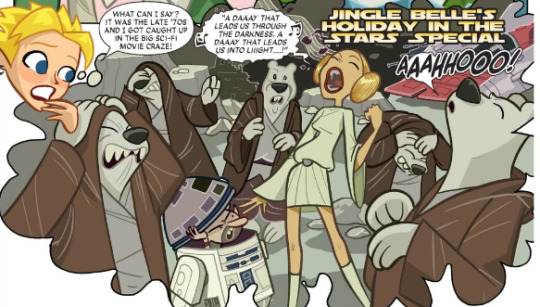
I mean I’m a sucker for any refrence to Star Wars Holiday Special. You’d think after several decades of jokes at it’s expense, with tons of youtubers, many of whom are dead to me but that’s besides the point, tackling the thing without it getting stale, that we’d eventually grow tired of mocking it but .. no. It’s a bottomless well of what they were thinking. The only question left is why isn’t it on Disney Plus.. I mean.. you made a second one as an affectionate parody and in lego. Kids are going to know about this now. Just put the thing up. Even edited down or just some clips. You put Rise of Skywalker up there, you’ve proven your threshold for shame when it comes to this franchise is vast. Just person up and do it.
But Jing’s learned her lesson.. stop motion only and to follow the bouncing formula to sucess. So in the special which sadly isn’t all stop motion and is just drawn to resemble the specials, probably for the best but still, Jing and her animal pals are sneaking into a town where christmas was banned! Meeting the chirstmas legion of doom.. well okay that’s what i’m calling them. Burgermeister Budweiser! Bungle the Abominable Snow Monster! Frost Master and Heat BLister! The Frost Fakir.. wait the what?

........
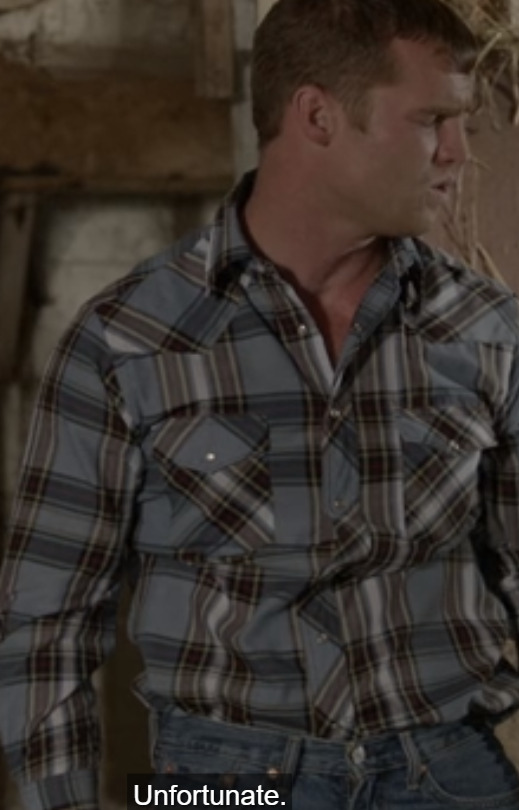
I mean where do I even begin? I know this was during the war on terror, I know that.. but still I expect better from Paul Dini for a crosses the line twice joke than “hey let’s just make bin laden into an ice wizard!”. I mean South Park made fun of him too, but they went all out with a looney tunes homage. Put effort in. And even years after he died the lonely island did this beautiful thing in the film pop star: never stop stoppin, which you should watch seriously watch it it’s underated.
youtube
Point is you can do better and if you don’t have room to do better then just.. don’t. You could’ve put in a t-rex in a top hat and monocle. That would’ve genuinely been better... because it’s better than everything ever btu that’s besides the point. There’s also one last addition to the rogue’s gallery thank god.
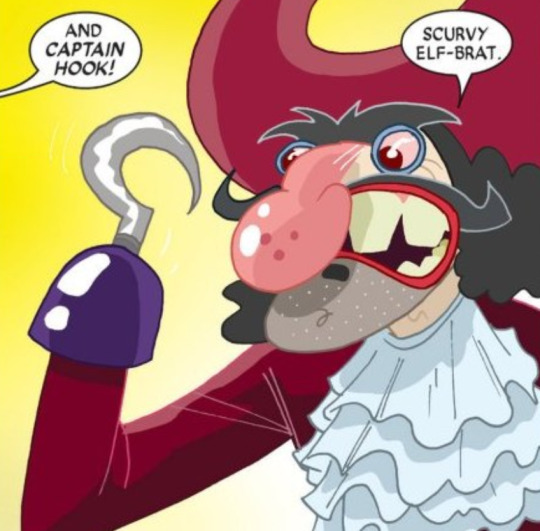
He hates her too. Now that gag is actually reallyf ucking funny. What’s also funny is how she solves things. By singing a nice and frinedly song about friendship to reform the villians.. or rather lure them over a bridge to get eaten by her orca friend.

So Jing after showing it to her dad heads to market it with him trying to warn her netoworks haven’t aired this kind of thing in years. But she faces the greatest threat to all of television: network executives, who keep offering advices and basically change the thing all together for stupid reasons and think cartoons should only be for kids despite it wokring in the past. Aka the hells animators STILL go through. I think Paul was projecting just a wee bit with this one. Given again IT HASN’T CHANGED since then, I can’t blame him. Seriously Harvey Beaks was canceled, among MANY ohter nick shows including rise of the tmnt just because it wasn’t an instant hit, Cartoon Network and warner keep trying to make dumbed down remakes of great shows, and Disney, among other networks, is fairly homophobic and while finally allowing some gay on the network this year had to be fought and outright refused it on ducktales for no adquate reason, caring more about monney and the bible belt than doing the right thing. So yeah as you can tell this bit got to me a bit and was hard to read because it. hasn’t. changed. 16 years and not a lot has changed other than more women are getting a chance. And granted the “kids are our only audiencce argument” isn’t as strong and several shows are powered by other demographics it’s still an issue and still the reason several good shows have gotten the boot and why the jeph loeb era of marvel animation was terrible. Because guys like him thought it should JUST be for kids and the lowest common demoninator of htem. You can be clever and be for kids dammit.

I apologize slightly for that it’s just something that’s been on my mind as shows dwindle and with ducktales gone the standard forbearaers for children’s animation are all pretty fresh faced. It’s just a lot to take in and i’ts been on my mind a lot.
Back to the actual story the result is a pretty purtrid cutesy special.. Jing reacts how you’d expect, destroying the tapes covertly with a herd of musk ox and destroying the tape. But they find the 70′s special and we end on that which is pretty funny. The only thing I really don’t like here is the ending. The rest of this special is really good: it’s clever , has some good satire and some really funny jokes especially that hook one. The ending just feels a bit weak.. like yes Jing wanted to be noticed but it’s not really an unsympathetic motive and while she does some shady stuff the villians still basically win by airing her terrible holiday special all over again. It’s just not satisfying.
But yeah overall another pretty decent holiday comic with some good jokes. I”ll probably see Jing again next year, and it was fun getting to dip into these comics. THeir not my faviorites, but their still pretty decent and if the complete collection ends up on sale on comixology or you see it in a bookstore and you think it’d be up your ally i’d buy it. Again not my faviorite thing ever, but still enjoyable enough. Coming up this week of holiday cheer: ducks, more ducks, superheroes, and a best of list.
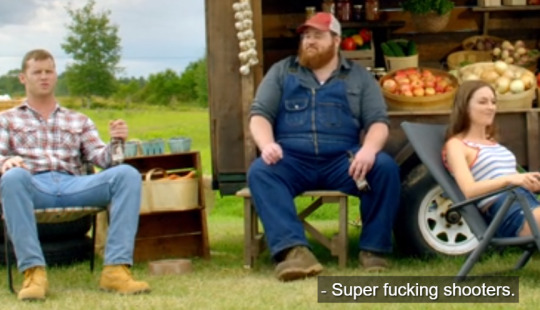
Until next time: Courage.
5 notes
·
View notes
Text
Okay so partially motivated by how many references there were in SPoP and largely bc it's been in my backlog for years and I remembered the whole thing got uploaded to youtube a while ago, I finally got around to watching Revolutionary Girl Utena for the first time so time for some hot takes
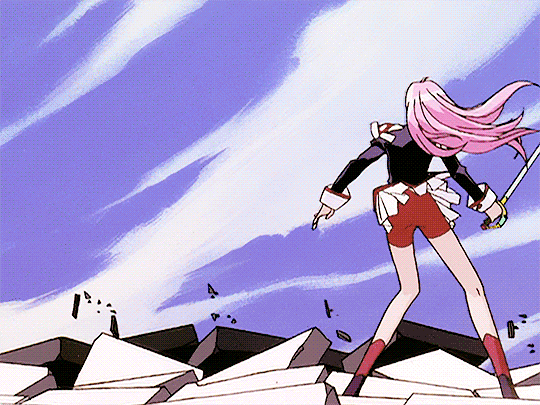
2 clarify I did see the movie about around 2000 which was my introduction to the series, and I did see like 1 episode back in anime club (over a decade ago now tbh) but for the most part I went into this with only a vague sense of the ending and offhand knowledge of a few of the weird comedy episodes so this was mostly a blind watch
Before getting into #spoilers I will say that this ended up being an easy Top 5 and that it's definitely still worth watching (fair warning for the very frequent rape and incest (and sometimes both)), especially if you've somehow also avoided most of the context of this show like me, and it really is one of the rare Nothing Else Like It kind of show (though it has roots in older shoujo like Rose of Versailles and modern stuff like Revue Starlight have picked up its lede)
Okay spoilers from here on
I really only kinda have vague memories of the more knightly take on Utena from the movie so Series!Utena having this powerful Dumb Jock Energy threw me
Like she's out here invoking the Air Bud Rule from minute one

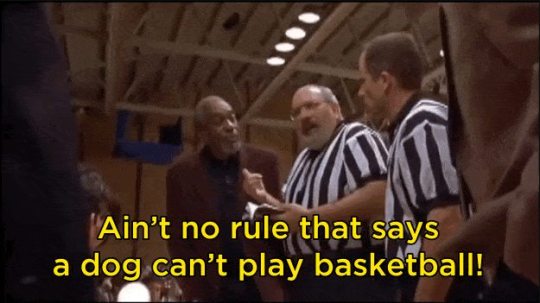
This bit where Akio is going on about some Important Life Lesson thing and she's just fuckin
crab walking im
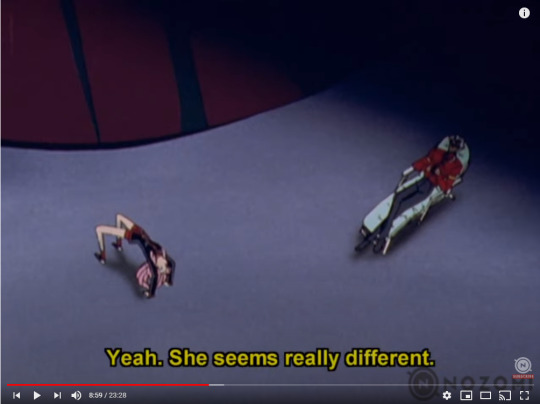
what a hero i love her
I have always kinda been more partial to shoujo than shounen bc the sense of like emotional urgency and the heightened exaggerated feelings are just more compelling to me narratively and what Utena does spectacularly is really drive that to fucking 11 and it permeates every aspect of the show
Like the melodrama of it all is so shameless and it's so committed to letting its visuals and music drive the mood and emotional intensity of its stakes that they kind of speak for themselves and demand to be taken on their own terms rather than having clear or rigid interpretations
Like it's kind of a situation of "yes most of what you're seeing ties into the show's bigger themes and characterization but also you can just vibe to the spectacle as well" like even when it's not on the Dueling Arena there's a theatricality underlying everything that pairs perfectly with the spirit of shoujo even as it... not necessarily contradicts it, but challenges it in some ways and also wants to coexist with it?
And I think that's the interesting thing how it wants to tackle some of these arch concepts tied into the genre while also being deeply intertwined with it. Like it really is a Product Of Its Time in so many ways but it also feels somehow timeless and transgressive in others even now?
Like part of me would be interested to see a remake that took into account 23 years of conversation about how much perceptions of gender and sexuality have changed but at the same time would it lose some essential part of itself in that transition? idk potentially
Also lbr a hypothetical remake wouldn't even attempt to revise anything it would just redo it thus making it pointless
So I know this has been a thing that's been brought up before but seeing it play out dang RGU and NGE really are just companion pieces to each other huh
Subverting the themes and narrative arcs of their respective genres, mysterious quiet girl who's directly the key to everything, the ritual of action setpieces rendered as Actual Ritual in the story, banger OP, comphet ruining everyone's lives
Also they really don't have much in common comparatively but I'm definitely seeing pieces of Utena in Kill la Kill too? Particularly how Mako's arc feels like a fleshing out and expansion from the archetype divergence Wakaba got in that one ep (I can't believe klk was the utena/wakaba au fanfic)

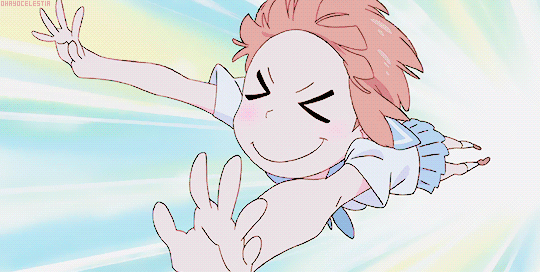
Speaking of which damn he is a sleazy bastard and a gross predator but ngl Akio can Get It he and Ragyo are basically the same character and I guess this is just my type apparently???? oops
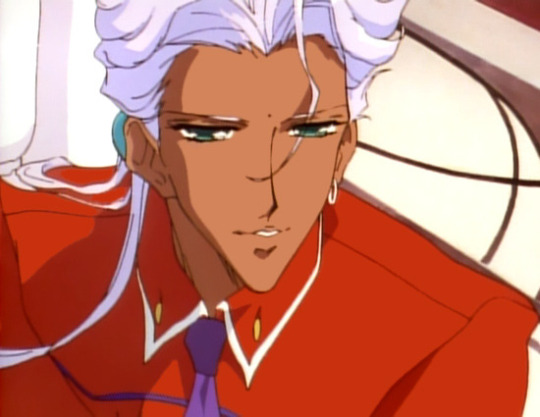

Like I'm recognizing how like really awful he is but also you really can't blame Utena for crushing on him he is super hot and charming
aside i lost it at the audacity of "well even tho i am a man like twice your age (AT LEAST) and took advantage of the situation and also i am clearly not the type to take no for an answer since you didn't reject me you're basically just as bad as me" bruh
The Black Rose Arc is... interesting bc like it borders on superfluous with how it resolves and yet the introduction of a "monster of the week" type power rangers element specifically built to expand on the secondary cast is a pretty inspired choice
again my primary point of introduction to the series was the movie which is basically a remix of the Student Council arc so when I got to 12 I was like wth are they gonna fill the rest of this with? WELP
What I really like about it is that usually this kind of setup-- the 'character is faced with their dark inner thoughts they shy away from and they become a short-term enemy' deal-- ends with the char in question coming to terms with this and overcoming it to become a better person
but here it's just like... they lose and then they just gotta... sit with that, forever. Like it doesn't really change the status quo of their relationships w/ utena or the others but it does just stick around for them and now the audience knows that about them too. like sometimes you just can't take that shit back.
Utena's relationship to queerness, having heard about it tangentially for years but seeing it play out now is also interesting bc while in the grand scheme it doesn't feel necessarily any more ahead of its time than something like Cardcaptor Sakura there is a casualness to it that's distinct
Like for the most part it's either kind of the tangential fluff that even then was part of shoujo as a standard but then there's also stuff like the Akio/Touga or Touga/Saionji hinting or Kozue's casual pass at Anthy in addition to the maintext Juri/Shiori push-pull and ofc the subtext-but-maintext Utena/Anthy threads
I wanna take a moment to talk about Juri bc of how kind of in the spirit of the show itself it plays things both with and against the grain with her
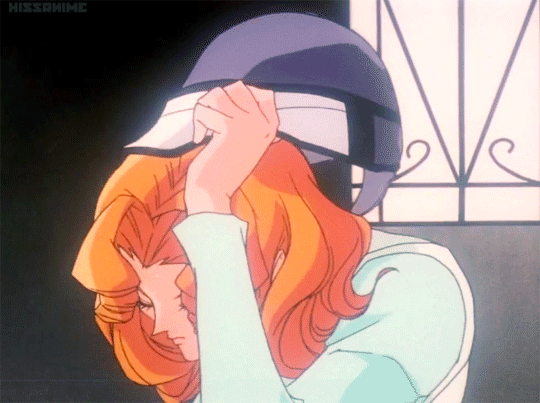
Like she's a Tragic Lesbian which is nothing new but usually this character type (and Distinctively Lesbian characters in general) in anime/manga tend to be portrayed as being very predatory, invasive and either played for laughs or to repulse the audience, so the degree of empathy RGU shows her in 97 is rare to see even now.
Like there is a "safeness" to her bc of how unattainable Shiori is (though their arc ends in a decidedly ambiguious way), but it doesn't really feel like she's getting the short end of the stick over the more straight-leaning characters bc arguably all of the relationships here are defined by an aspect of chasing the unattainable, echoing Utena's own quixotic search for her Prince, and her choosing to remain closeted feels realistic *especially because* of the surrounding context of how heteronormative the world she exists in is. Like the character is aware of that and is navigating it in a way that feels honest
Speaking of which it's interesting how the reveal of Juri's pining for Shiori in Ep 7 echoes the bigger reveal of Utena/Anthy bc of how it plays up this heterocentric love triangle or at least it seems to be but then the cards are on the table and no that's really not what it is at all, and it feels significant that after spending most of the series naively oblivious to Juri’s feelings and what she wants out of a relationship with Shiori that Utena finally Gets It in Ep 37
Is it a coincidence Juri actually gets to be the one to point it out? No
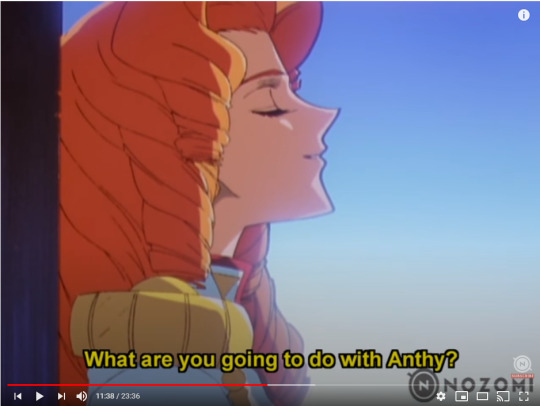
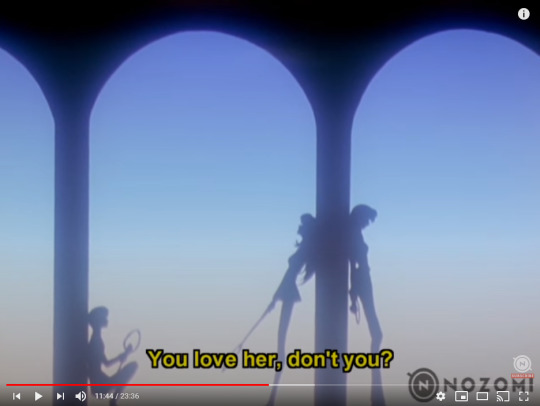
Speaking of triangles big ups to the Ruka/Juri/Shiori one honestly bc of how hard it commits to the unknown third result of a LT where absolutely no one comes out happy and it actually works even with the handicap of Ruka basically coming out of nowhere just for these two episodes
Like all three of them want the one person who's absolutely never gonna love them back and that's just rough buddy and isn't that kinda the show in a nutshell
So the thing that struck me about Utena/Anthy and how it plays out is how subtle it really is. And that does make sense bc while f/f teasing/subtext again was part of shoujo before it's quite a different thing for the heroine to ultimately reject her 2 male love interests and choose a life with her female best friend, esp in nineteen ninety seven
Like I think you can argue that Ep 12 feels like The Moment where What Their Relationship Is, Definitely shifts and that possibility is suddenly there, and then it doesn't come back in a big way until the ending but there are tiny glimpses throughout where you can see that working in the background if you’re really paying attention
Small things like Anthy's flashes of unspoken jealousy, Utena fretting over her even when she's in bed with Akio, and part of that is coming from going in with a knowledge of what the endgame is and keeping an eye out for it. I can hardly imagine being a viewer during the og broadcast and then ep 34 comes and suddenly the intent is made clear and our understanding of the inciting incident gets all flipped turned upside down
And to a modern viewer I can get coming into this for the first time and being frustrated at just how close to the chest it gets played, but that's also kind of the only way it gets to happen at that point in time? But I think it ultimately is effective and vital to their individual arcs and dovetails nicely with the themes of the show
Like I remember hearing that original manga creator Chiho Saito was pretty against their paired ending, but with a lot of convincing from Ikuhara ultimately came around to it, and it's hard to imagine the anime's ending working any other way and being nearly as impactful
And there is something really beautiful about the bucking against the established idea of yuri relationships being a childish concept that gets left behind in order to 'grow up' actually becoming the impetus of their own journeys into adulthood and eventually back to each other, and it’s hard not to feel a little disappointed that for this Bold Step and declaration for the future that RGU takes that while yuri is more common than ever it largely continues to exist within the realm of schoolgirls and something to be left behind in adolescence like for RGU’s faults and shortcomings it saw this world of possibility in moving forward, while the genre largely elected to stand still

And it really speaks to either the timelessness of the show or how much the queer experience has remained constant that even with a tragic ending, that hope, or rather the promise of their reunion, feels bold and defiant and genuinely uplifting even now
Like the moment where just before they reach out to each other one final time, and their voices as children speak out to each other, as if finally fulfilling a promise they barely remember, I really did just start ugly crying
Lastly some assorted closing thoughts--
-Touga? Punk. Guy really takes advantage of Utena's whole prince thing to manipulate her, ends up losing to her in the rematch and then fucks off to mope for like AN ENTIRE SEASON then pops back up "oh yea im in love with her literally nothing else about my behavior has changed tho" like lmao you tried i guess
-Also i know Touga's design is p stock standard bishounen ojou-sama type but god this is all i can think about when I see him

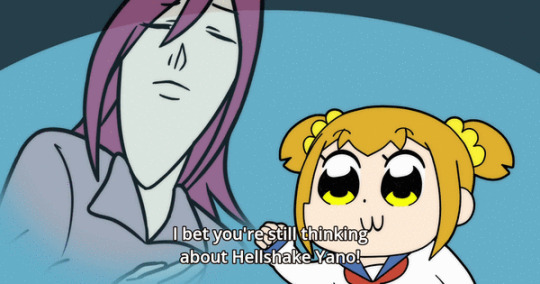
- Green Touga Saionji is a bitch-ass motherfucker but like he at least tried more than anyone else so uh that's something I guess?????
Like the guy clearly has some unresolved feelings about Touga so i'm inclined to be sympathetic bc wow poor choice my dude but also... bitch-ass motherfucker
-Nanami really went through this thing for me where it's like... she's a brat and a shitty person but it's also hard to really dislike her bc she does get what she deserves most of the time and also she gets kinkshamed more than most of the cast despite none of them really having a high ground over her lol

-Miki did nothing wrong (aside from like the implied incest but that's also like... half the relationships in this show uh)
sidenote I can completely see the notable excess of Incest Subtext/Maintext being intended as like... A Thing to comment on how common it is within shoujo and also tying in to like the bigger themes of Growing Up bc the idea that you’re chasing after your own damn siblings betrays some freudian inability to mature or whatever but tbqh it doesn’t always feel like the show knows the line between commenting on this and indulging in it and RGU is very indulgent by its own nature so I really can’t blame people put off by the show as a whole bc this is an area where RGU is largely indistinguishable from its genre peers
-Juri really did nothing wrong tho also props for having the best duels
-FUCK SHIORI THO for eel
so obviously i have not seen the show up to now but I've been in yuri circles for a long time so I knew about Juri/Shiori and my perception of it had always been "oh it's one of those kinda messy with complicated feelings" kinda ships where the drama is a big part of the appeal and that's true but like
the actual nature of it I did not realize up to now and OH SHIORI'S REALLY THAT BITCH HUH
So not only does she date that one anonymous guy specifically to spite Juri unaware she doesn't actually like him BUT THEN WHEN THEY GET REUNITED SHE'S JUST LIKE LOL IT DIDNT MATTER BUT HEY WE COOL RIGHT *AND THEN* when she finds out about Juri's feelings she's like HELL YEA I CAN HANG THIS OVER HER HEAD FOREVER FUCK HER
***AND THEN*** when she gets some karma after Ruka dumps her ass she airs her dirty laundry out in front of EVERYBODY like Juri hasn't been dealing with this shit like an absolute champ the whole time like?????
Like ok i get that there's the sad longing drama there and usually that's my jam and the show itself seems to end on kind of an ambiguous note and the follow-up manga from this year seems to leave it as kind of a "maybe" but I'm sorry get Juri a better GF 2020 she deserves better
I saw some Juri/Wakaba going through the tumblr tag for the show and honestly that's some big brain shit I'm here for it
Also now knowing exactly how this dynamic operates it really makes that Jasper/Lapis reference pic one of the SU crew drew of them read very.... interestingly???????? (tho Lapis' design reads a lot closer to Kozue and that's probably a closer personality analogue too)


-I love that thing in ep 37 where the whole SC is just very casually like hey utena if the whole revolutionizing the world thing with anthy doesn't work out uhhh call me im free haha just kidding unless...? lmao
-I'm pretty uninclined to try to pin precise sexuality HCs to characters for series this old where the ambiguity is part of how its danced around like partly coming from my own experience I'm inclined to read Utena as bi but that really is just coming from me?
But on the other hand literally every time a guy is like "i love you utena come be happy with me and we can love each other forever" she's like "k" after having left them on read for a day and disconnects from them entirely so lesbian going through comphet is a pretty valid read i think lol
-Lastly I think it’s pretty interesting but validly frustrating how fast and loose the show’s relationship with dream logic and non-traditional storytelling really is like when the shadow girls show up I was like “oh this is a greek chorus thing and it’s meant to reflect on the themes of the episode” (or uh in the case of exactly Ep 29 to break from tradition and explicitly tell us what a characters deal is lmao) but then no actually turns out they’re actually real characters who exist within the show too fuck you
ANYWAY I really did love this show and felt like I got a lot out of it despite it being pretty infamously hard to decipher but the ways it's inscrutable appeal to me specifically so very happy with this I'm gonna be thinking about it for a while
#revolutionary girl utena#cw: rape mention#cw: incest mention#might follow up with some thoughts about the movie later
20 notes
·
View notes
Photo

“The first peace, which is the most important, is that which comes within the souls of people when they realize their relationship, their oneness with the universe and all its powers, and when they realize at the center of the universe dwells the Great Spirit, and that its center is really everywhere, it is within each of us.” ― Black Elk
I heard the phrase “you are the Indians now” over three decades ago.
I do not remember exactly who said it, I think it was in a conversation with Russel Means, if was said in a speech or to me privately, but that does not matter much. I heard it the other day in a commercial Hollywood production, “You are the Indians now” and realized that industrial colonial commercial America was finding one more way to take the strength and power out of the words we need to survive. When a phrase is taken out of human context it begins to lose its power. When a thing is commercialized it quickly become trite.
We must understand that this phrase, “you are the Indian now” actually does have meaning and power. It is a reality we all need to understand as we are demeaned, bullied , locked down and social distanced by those we have given economic, military and political authority to – what Eisenhour called “the military industrial complex”. To understand this all we need to do is look at how the authority of the military industrial complex that stretches back through American history has been used to the “profit” of the few at the expense of the many.
America was opened by the ever-expanding greed of the Euro-Asians. The Spanish who had recently broken the rule of what they considered an occupying Afro-Asian power, Islam, began to assert itself and in its assertion of its power created the voyage of Columbus not as a voyage of discovery but as a voyage of economic power and expansion. Columbus’s voyage was quickly followed by Cortez, Pizzaro and a multitude of the leaders of Spain’s military industrial complex. ( Even though this term had not been invented yet it is the appropriate shorthand for those who would rule.)
Push forward barely 300 years and South America, plundered as thoroughly as the Spanish could in their own areas of captured authority saw another economic power create a myth of shaking off the plunderers to the north, the English, and form a new “non colony” colonial power.
It was a strange combination forces that created the United States – men of considerable economic authority created an economic war but based upon human principles of freedom and self-governance. The reality is they laid the foundation a great colonial power. They used the power of myth and spirituality to unite the colonials and in time won an economic war against the mother corporation. These were smart men and oddly sincere, with possibly only Jefferson understanding the dangers inherent in the authority of economic power. Jefferson spoke strongly about not giving economic power and control to bankers, yet Hamilton did, and created the source of the force that was to colonize north America through the military industrial complex that slowly grew, in it’s need and greed for land and all the resources it contained – animal, mineral, lumber.
“So Indian policy has become institutionalized and the result has been that American people have become more dependent on government and that the American people have become more dependent on corporations.” ~ Russell Means

The devastation that followed for the American Indian nations was total and it was accomplished at first by outright war and disease and later by confinement, control of movement , isolation and most of all by breaking the power of the spiritual structures of each community that was conquered. This occurred in America while the European economic powers did the same to Africa and Asia.
It is important to understand that behind all this “colonization” were corporations – powerful economic institutions controlled mostly by men, institutions built upon the love of “growth, development, money, possession” feeding their narcissism. These were and are men (and women) who truly believed that they were creating a better world though pillage of communities around the world and breaking the local social and spiritual systems they encountered.
And today – here we are again.
The corporations are supporting political authority that use that authority to again break people to the will of the power of corporate economics.
Do not be fooled by thinking that the corporate war between Donald Trump and the Globalists is in your interest. It is a war about who will control the economy of the world. And it is not a race war – though the corporatists want you to think that. The heads of the corporations are as much Chinese, Arab and African today as they are American, French , Swiss and German. Race becomes the bait for the conflict which allows them to distract us while they remake the few institutions, we have that are foundational for us to not all become slaves to their consumer machine. And just as they did with American Indians, African and Asians, one of the fundamental tenets of corporate power is that we need to be separated from the land and from each other and the social and spiritual cohesion that healthy societies have.
Are these people knowingly evil? Not really . Well maybe some are.
They do meet together at places like Davos and the G – summits, however many are part of the economic powers at the moment and discuss how to wring the greatest “wealth” for themselves out of the earth. Do not think for a moment however that they are really concerned for your welfare other than as a commodity which they can exploit.
The activist/poet John Trudell says this well –
“It’s like there is this predator energy on this planet, and this predator energy feeds on the essence of the spirit.”

The worldwide lock downs have crushed the poor, increased domestic violence, suicide and fear. We all know this – at least those who continue to not trust a government that they understand is the hand maiden of the industrial/commercial/ colonial ruling class.
“The darkest secret of this country, I am afraid, is that too many of its citizens imagine that they belong to a much higher civilization somewhere else. That higher civilization doesn’t have to be another country. It can be the past instead—the United States as it was before it was spoiled by immigrants and the enfranchisement of the blacks. This state of mind allows too many of us to lie and cheat and steal from the rest of us, to sell us junk and addictive poisons and corrupting entertainments. What are the rest of us, after all, but sub-human aborigines?”― Kurt Vonnegut

This has played out it the media as a racist battle, but it is no longer, if it ever was, about race. It is about exploitation. It is about breaking the populations of the world into a weakened consumer serving class.
The economic authoritarians have used a broken economic theory, socialism, to create turmoil with its false promise of a new age and we, now educated by the schools they took control of fifty years ago,creating a watered down curricula that discourages thinking and enhances emotion, have used Marxism to create a fundamental break in our society. The people founding and running BLM are as much operatives for the colonial driven Chinese oligarchy as the Chinese scholar spies in our universities. But again, it is not just the Chinese nor just rich white people – it is the authority class – those who control the flow of information as well as the power of the ability to work.
We are all Indians now, and African and Asian who have felt the power of the colonial might of the corporations to lock us in our homes, to cover our faces live oppressed muslim women, to comply out of fear.
Colonialism is not new, and it is not white, though its latest historic manifestation was white beginning with the Spanish rape of central and South America. Colonialism is historic, it does not know race – it is when one people believe they have the right and the authority to use other people to gain wealth for themselves. The Mongols who swept out of Asia into Eastern Europe and India, the Muslims who charged out of Arabia and north Africa were as much colonizers as the Persian , Romans, Greeks, Egyptians. The real tool that all colonizers use is the dehumanization of other men women and children and create them as commodities either on the slave block or on the corner of the block talking about the latest phoney fad created in shoes.
When one looks at world history there seems to be a certain inevitability to this colonial oppression.
There is really only one hope and that lies in the spiritual path of turning to a larger power than all of us whether we call it god, grandfather, mother earth – and becoming fully human in our relationships. To do that means we turn away from consumerism and turn toward our relationship with all life that we share on this earth. And we fight back, we refuse to surrender our individual faces, our shared life and death and grief. Although the churches, mosques, synagogues and temples have at times been as much of the problem as the solution the fact that those in authority do not want us to gather there speaks volumes to the power of the spiritual life and the need to gather there to good purpose.
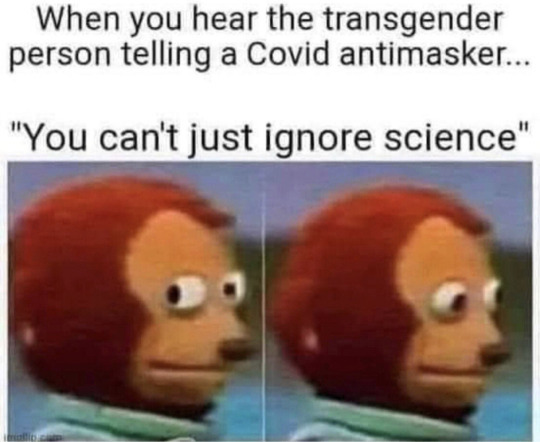
Again John Trudell - “We have power… Our power isn’t in a political system, or a religious system, or in an economic system, or in a military system; these are authoritarian systems… they have power… but it’s not reality. The power of our intelligence, individually or collectively IS the power; this is the power that any industrial ruling class truly fears: clear coherent human beings.”
3 notes
·
View notes
Note
I read that one posts. I agree with Sol. I think it's more likely that Dreamworks crunched the numbers, figured it wouldn't be profitable and just canned the project than them cancelling it because of a very small section of the internet. p1
“p2 Mecha is just a dying genre as a whole. Even in Japan, isekai has taken it's place and there are hardly any new mechas outside of Gundam. That's in Japan! In the west, mecha is even more niche of an interest and general audiences don't gravitate towards it. I don't think that any mecha movie wouldn't do well at the box office. I'm even worried about that Gundam movie bombing at the box office.”
Hi Anon, thank you for the Ask!
Yeah, I agree with Sol too—and at risk of repeating what I’ve said in other posts about the movie thing—it’s really hard to convey just how incredibly unlikely a property like Voltron or Robotech will ever be made into a live-action movie. It really is about the numbers, as it always has been. Since the 80s, there’s this whole persistent and stupid element of the cartoon industry that continues to delude itself that promises or interest from Hollywood will ever pan out. There are so many scripts sitting in production limbo, that it’s almost criminal.
No one wants to risk money on a live-action movie based on children’s media IP that won’t bring in rated PG-13 or R dollars from adults, and no one wants to risk repeating the 80s He-Man film. The exceptions are live-action films made from children’s media IP that are fully owned by the company paying to produce the movie. I’ve got more to say about the complexities of royalties, but that’s awfully long-winded when I get into it, and I’d rather be long-winded about giant robots. (◕ᴗ◕✿)
The topic of mecha genre dying out is what really interests me here. It’s a topic that I think about a lot, as the beginnings of the mecha genre had a lot of deep cultural time-and-place stuff behind it, even if the stories were just kids and teen boys hopping into a giant robot to beat up other giant robots and monsters, in what were essentially 30 minute long toy commercials.
Isekai will come-and-go as all genres do. It’s not a new genre, but right now the types of themes driving the isekai stories being made speaks to a lot of interesting things happening in the youth of Japan’s relationship with digital gaming and role-play escapism. It’s fascinating, even though the focus of the genre as it’s done today hasn’t really grabbed me in the same way that isekai of the 80s-90s did.
Mecha isekai exists, and it’s only a matter of time before someone either remakes Vision of Escaflowne, or does a more mecha-focused isekai story similar to Magic Knight Rayearth. I doubt anyone would revisit Aura Battler Dunbine, or Super Dimension Century Orguss, but an otaku can dream.
Before we can say the mecha genre is dying, let’s briefly skim over the genre trends of the past +40 years. Every decade or era of mecha anime has a trend that reflects cultural concerns built into it, in a way that I don’t think any other genre of animation can touch (until now, with Digital/Virtual/Fantasy RPG World Isekai).
Late 60s-70s was: Super Robot smashes monsters and alien robots
Mid-70s – early 80s was: Combining Mecha Sentai Team Super Robot smashes monsters and alien robots
80s was: Real Robot + “how many sci-fi/fantasy settings can we put a robot into?” + the death-throes of Super Robot (e.g. Dairugger XV, Golion, Baldios, Godmars)
Also 80s: What the hell was Super Dimension Fortress Macross about? Cold war tensions of escalating end-the-world arms race meets an alien species whose only culture is fighting. Where songs about love, and the culture of love, are what win the day, not just transforming robots and big guns. Macross is deeper than it lets on.
Fun 80s: GoShogun happened. The first parody-satire mecha anime that still feels more serious than they intended, but is actually hilarious once you get past the dated gender roles humor (which was also kind of intentional satire).
WTF 80s: Space Runaway Ideon broke everyone’s minds.
Still not done with 80s: Gunbuster happened. The first angst-driven parody-satire mecha anime that blew everyone’s minds.
Late 80s-early 90s OVA mecha was a mix of Serious Cyberpunk-influenced Real Robot for older teens and adults + Mecha with Tits & Tentacles for Adults (see also space elf lesbians).
90s was: The Franchises Will Survive With Prettier Pilots, and Super Angst-Bot That Was Way More Influenced By Drugs And Ideon’s Ending Than Anyone Wants To Admit (aka Neon Genesis Evangelion) + “Since Gunbuster was a success, how many parodies of Super Robot and Real Robot can we do?”
Mid 90s isekai gems: Magic Knight Rayearth and Vision of Escaflowne
Late 90s: Brain-Powerd (not a typo) happened and it’s a shame no one remembers it. I’ve seen it’s influence come up in the 2000s – 2010s.
The 00s seem to be filled with a lot of re-treading of everything that came before but with different cross-genre influences and some of it really damn good but hard to remember because it all kind of blends together.
The 2010s-today: I have no idea what’s happening now b/c I can’t keep up with anything that isn’t Gundam. And why bother when there has been a flood of classic 70s-80s mecha releases—many for the first time in the US—to binge watch?
Knights of Sidonia was cool.
Since I haven’t kept up, I can’t speak to what new mecha anime is like, or why it's less popular (though I have an educated guess). It was gonna happen eventually, and I suspect that the kinds of post-nuclear and Cold War existential dread that informed mecha anime of the 60s-80s has moved on as target audiences grew up. Those lates 80s OVAs, where the stories could be more adult, reflect that growing up (and also Blade Runner’s influence).
I see the 90s as very transitional, includes reactions to the prior eras, but also reflects a lot of angst by Japanese teens and young adults caught up in the after-effects of 80s stagnation, and the constant test-studying to get into the best school to get the best job (if it exists) and figure it all out before you’re 14 so you can pick the best school to test into. Also, salary-man dad works 120 hours a week and is never home. Get in the Angst-bot Shinji.
Excluding the stand-out brands that survived their respective eras: Gundam, Macross, Braves series, Mazinger Z, Getter Robo, Evangelion; there’s not much other ground that can be covered right now that would warrant a series. The franchise mecha shows are grounded in their respective niches. It’s kind of odd that there isn’t an isekai mecha franchise, b/c that’s a niche that hasn’t been owned in the way that the other niches have (unless maybe Machine Hero Wataru is still a Thing?)
It’s worth mentioning that Sport Anime has really been having a moment for almost a decade now, and that’s super interesting to compare against isekai. Isekai about dungeon slimes or whatever vs literal horse-girls racing each other like high-school track. Thanks Japan, are y’all all right over there?
A few last things:
The success of Super Robot Wars tells me that mecha genre isn’t dying. Consider the ages of players. How many of them actually grew up watching Yuusha Raideen (aka Yūsha Raideen / Raideen the Brave)? There is an SRW manga anthology series, and loads of gachapon and collector’s grade mecha figures from old mecha anime get released with regularity. Someone’s buying that all that shit.
SRW is nearly 20 years old now, and they are still making video games that do one thing really well: rotate a 40 year old cast of everyone’s favorite robots into a battle strategy game held together by a duct-tape plot that doesn’t take itself too seriously. The games are fun, and it’s cool to put all these mecha into the same field. It’s really great to see older shows that will never be remade have little cut scenes in a newer animation style that still feels like the originals.
There’s also the old staple that started it all: the tokusatsu genre of live-action Super Sentai shows (e.g. Power Rangers). They’ve been making the Super Sentai Series since 1975, and there’s still fun to be had watching color-coded warriors use special powers/tech to summon forth some combining mecha to do battle with rubber suit monsters from outer-space. The effects are much better these days, but it’s the same formula, year after year and people still love it.
So with respect to mecha, I think what’s died or dying, is that people are afraid to have shameless child-like fun with giant robots. The genre got too serious and too angsty (and too horny without the grown-up edge of 80s OVA Tits & Tentacles mecha). The franchises carved their niches and aren’t going anywhere, while the genre survives in video games and collectables.
A lot of that shameless fun has moved into other genres, because nothing else explains a title like: “Is It Wrong To Pick Up Girl’s In The Dungeon?” or the nearly-ecchi concept behind the sports anime “Keijo!!!!!”. But that kind of fun is less child-like and more self-deprecating or pervy-humor. Both sports and isekai anime have their serious side, but seem to be dominated by stories that don’t take themselves too seriously, or like Yuri on Ice, aren’t afraid to take a concept that no one ever saw coming, and shape it into a good story.
I eagerly await a mecha sports anime (wait, no, I think that already happened), and I’d love to see a knock-out isekai mecha anime again. I think it will happen eventually, but probably not from Toei or Sunrise. If Tatsunoko could get beyond Moe Idols In Space, then the Macross franchise already has everything it needs to do a isekai series. That would be rad.
14 notes
·
View notes
Photo
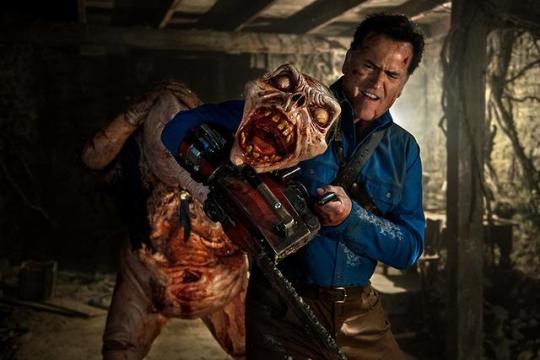
Groovy! Bruce Campbell finally shows up to Rock and Shock at DCU and Palladium.
Here’s a short article style interview with Bruce Campbell on Ash vs. Evil Dead.
WORCESTER — All right, you primitive screw-heads, listen up!
“Groovy” Bruce Campbell is coming to Rock and Shock this weekend (Saturday and Sunday only) at the DCU Center to bury Ashley “Ash” Williams, not to praise him.
The chainsaw-wielding,“boomstick”-carrying, wisecracking, Deadite-slaying hero of the “Evil Dead” movies and Starz network’s original series “Ash vs Evil Dead” is no more, according to the 61-year-old Michigan.
Last year’s finale of “Ash vs Evil Dead” marked the end of Ash and the “Evil Dead” universe, as far as Campbell is concerned, so much so that he added a “Requiem for Ash” chapter in the paperback version of his New York Times best-selling autobiography, “Hail to the Chin: Further Confessions of a B Movie Actor,” in which he says, “Out of respect for my ability to properly portray a particular character, I’m retiring Ash, not retiring from acting. I’m retiring from a very technically demanding type of acting, not the craft itself.”
In 1979, Campbell, his high school pal (and future A-list Hollywood director) Sam Raimi and fellow Michigander Rob Tapert scraped up $350,000 and went out into the woods to shoot the low-budget film, “The Evil Dead,” which took them four years, on and off, to finish.
Not only did it become an instant cult classic and one of the most successful independent films ever made, “The Evil Dead” spawned two sequels, 1987′s “Evil Dead 2: Dead By Dawn” and 1992′s “Army of Darkness.”
And, when “Evil Dead” fans were clamoring for 20 years for a installment, Campbell, Raimi and Tapert gave them an “Evil Dead” remake (without Ash) instead.
“Unmercifully, for years, it was ‘Evil Dead 4’! ‘Evil Dead 4’! ‘Evil Dead 4’! People wouldn’t shut up about it,” Campbell said during a recent phone interview. “We gave them a remake. Some people thought it was OK. Some people thought it was too serious. Some people were pissed there was no Ash. So, all the remake did is poked the zit. So, we went, OK, let’s give Ash his final hurrah.”
Rock and Shock info:
After decades of saying it’s never going to happen, Campbell suited up (with chainsaw as hand) as Ash — not in “Evil Dead 4” but for three unrated seasons of “Ash vs Evil Dead,” a series that ran from Oct. 31, 2015, to April 29, 2018, on Starz.
“No studio is going to give you multi-millions of dollars to make an unrated movie,” Campbell said. “So, in this case, we thought, OK, let’s bring it back as a TV show. We can do a lot more material. So you get 15 fresh hours. If those were movies, it would have taken us 20 years to put out that much.”
Filmed in Auckland, New Zealand, with the same creative team that worked on the “Lord of the Rings” trilogy, “Ash vs Evil Dead” was a step up in quality from the early, low-budget “Evil Dead” films.
“These craftsmen were able to finally silence all the people who were like you and your low-budget effects,” Campbell said. “Our art direction, all of the design, the effects, the stage work, I put up against any show out there, perhaps with the exception of ‘Game of Thrones.’”
In addition to the creative behind-the-scenes crew, Campbell praises his two, game-for-anything co-stars, Ray Santiago and Dana DeLorenzo, who played Pablo and Kelly, respectively.
“We got lucky,” Campbell said. “I don’t use that word much but we were very fortunate in that we got two actors at the right time. They were very game. They were very ready. They had some experience but not too much experience. And they left it all on the table. Ray and Dana, it was great to watch them do their stuff.”
“Ash vs Evil Dead” also reunited “Xena: Warrior Princess” (Lucy Lawless) with Autolycus, the “King of Thieves” (Campbell).
“We knew we wanted Lucy desperately. And I don’t know if we served Ruby (Lawless’ “Ash vs Evil Dead” character) as well as we should have. That’s my only regret,” Campbell said. “I never saw her have a bad day on set. She’s always polite, always professional, and she kept me in line. I mean, she really did. I get a little pissy on set. I look over at her and she’s like, ‘C’mon, same team, same team.’ I would use her in anything. She can do anything.”
Campbell said his inner fanboy was very excited working opposite Lee Majors, aka “The Six Million Dollar Man,” who agreed to play Ash’s potty mouthed, womanizer dad on “Ash vs Evil Dead.”
“Lee got the joke and he loved the fact that he could play a guy that was so not Lee Majors,” Campbell said. “It couldn’t be any better than this, doing a scene with Lee Majors, talking about your bionic hand. And he goes, ‘It looks like some piece of (expletive) made in China.’ Those are the little golden moments that made the drudgery worthwhile. I still call him dad.”
Campbell said his favorite “Ash vs Evil Dead” episode is “Delusion,” in which Ash wakes up from a nightmare only to find himself in an asylum with a demonic “Ashy Slashy” puppet.
“Honestly, that (expletive) puppet is haunting me to the end of my dreams,” Campbell said.
As for the sickest, most disgusting and depraved scene he filmed on the show, Campbell said it was when Ash’s head goes up a cadaver’s butt.
“It wasn’t intended initially,” Campbell said. “Ash was just going to have a fight with a colon and then our trusted producer, Mr. Rob Tapert, said, ‘I know what you got to do. You got to go up butt.’”
While fans are forever hopeful for another installment of the further misadventure of Ash and his faithful “boomstick,” Campbell said he had to put the kibosh on it because the role is too much physical wear and tear on the middle-aged actor.
“I would send a series of emails to the director about the upcoming episode warning them of my infirmary would get worse as the season went on,” Campbell said. “And, honestly, if we did a season four, you know people would have said, ‘Hey, if we only had a season five.’ Then, you do a season five. They’d go, ‘If only we had another movie.’ So you have to accept the fact that ‘Evil Dead’ fans will never ever be satisfied and that’s OK and that’s why we love them.”
In fact, Campbell said likes the way they ended the series.
“You finally let the schmo have his day,” Campbell said. “Ash’s not just a guy in a crappy trailer home. He’s actually is a guy written up in an ancient book (the ‘Necronomicon’). So he goes off to battle evil in the future with a hot robot chick. What the hell wrong with that? It’s perfect.”
If they had a season four of “Ash vs Evil Dead,” Campbell said he would have killed off Ash once and for all.
“I’m sure Sam Raimi or Rob Tapert would have had a heart attack but Ash would have fulfilled his destiny,” Campbell said. “He would have battled evil in the past, present and future. That’s fulfilling his destiny. Hands the mantle to the new man or women, child or beast, dies heroically saving the day ... So it’s a big sacrifice, total Luke Skywalker, Joseph Campbell. I’d go all the way.”
Campbell is not only the most requested guest at the popular horror convention in its 15 years of existence, “Rock and Shock” organizers have been trying to get the Ash actor since day one. So why now?
“Every year is different in this roadshow called Bruce Campbell,” the beloved B-movie actor and New York Times best-selling author said. “It was due. And I’m selling a paperback version of ‘Hail to the Chin: Further Confessions of a B-Movie Actor.’”
Campbell said he can’t wait to finally meet his “Rock and Shock” fans.
“A lot of them are very shy people,” Campbell said of his fans. “They wait two hours in line. They come to the table and they can’t say anything. And I feel for them. So I torment them.”
For those who dish out their hard-earned dough for a photo-op, Campbell offers these friendly words of advice.
“Bring props. Props are good. Bring ‘Evil Dead’ books, axes, chainsaws. Let’s spice up your photo. Wear something kooky. Dress up. Wear a shirt with a collar,” Campbell said. “If you’re going to get a photograph that’s’ going above the mantel, come on man, put some pride in it.”
23 notes
·
View notes
Photo

(for some reason when i answered the ask, it wouldn’t let me put it under a read more and this drabble is a bit on the longer side so hopefully this is okay. my apologies!)
The first night Della spent on earth in ten years, she cut her hair. Beforehand, it was something she did quite often. Her hair had been rather short when she’d first crash-landed her rocket, not the shortest she’d ever had it but definitely much shorter than it had become. But unfortunately for her, the duck’s hair had become quite lengthy during the duration of her unexpected departure from earth, and the moon didn’t exactly provide supplies for her to cut it like she wanted. That and she found herself more focused on survival than a haircut.
She’d gotten used to it, but that didn’t mean she really liked having it that long. Della had been eager to cut it as soon as she was able to, and there was nothing more relieving than taking the scissors to her lengthy white hair and hearing them do their job with a satisfied snip. She stared down at the mess of hair it left on Scrooge’s bathroom floor, laughing at a sudden flashback that popped into her head of her uncle getting angry with her for leaving it there many a time in her teenage years. Luckily, she’d learned better by now and began to dispose of it with a broom and pan.
After she cleaned up, Della looked in the mirror to see her new hairstyle. It was about shoulder-length, not as short as it was when she’d crashed but much shorter than it had become. Maybe one day she’d cut more of it off, but this would do for now. As she looked at her reflection, a certain moment from her time stuck on the moon played in the back of her head.
“Your hair keeps falling into your eyes, do you know that? Here, lemme just—”
“Penny, I’m fine!”
Della laughed and playfully pushed her roommate away, blowing the strand in question out of her face so she could give her a smile.
“But it’s annoying me!” Penumbra crossed her arms. “Why don’t you ever tie it back or wear a helmet or I don’t know, do something with it so it won’t get in the way of your work?”
“I’ve learned to work around it,” Della said with a shrug.
“How can you work around hair that long falling in your face all the time?”
“I dunno. I just do. I’ve had hair like this for nearly a decade.” Della shook her head, showing off her long locks. “I will admit that it’s not my favorite, but I’ve adjusted.”
She continued to weld together the gold she was using to remake her ship, and Penumbra stood behind her and watched her for a while before rolling her eyes. “I don’t see how you can stand it.”
“Of course not,” Della giggled. “You don’t even have hair.”
Penumbra gasped, sounding offended. “I do too!”
The duck’s eyes lit up, and she whipped around to Penumbra once more. “You do!?” she exclaimed, hopping over to her roommate. “You gotta show me!”
Della reached a hand up toward Penumbra’s helmet, intending to rip it off, but she was stopped by the moonlander’s strong grip clasping around her arm and her angry stare fixating on her.
“You are not to touch my helmet. Understand?”
“Okay, okay! I won’t, sorry!” She flashed Penumbra a cheeky grin as she recoiled her hand backwards and away from her grip.
Della moved her head from side to side, watching her hair follow its movement. She did it a few more times before turning her attention toward the bathroom window, where the moon could be seen. It looked so small on earth compared to its actual vastness, for Della had been taken off-guard by how large it actually was once she had the chance to explore it. There were a lot of things about the moon that had taken her off-guard, come to think of it. However, the society of aliens who had welcomed her into their hidden home and helped her get back to her family was the most surprising and perhaps the only thing she missed. Especially one in particular.
She turned her attention back to her reflection, looking over her new haircut, paying close attention to how it kept her hair from falling in her face. Della began to wonder what Penumbra would think of it once she got to earth. Or at least she assumed Penumbra would visit. She had to miss Della as much as she missed her, right? Although she was unsure if it was because it had been a while since she’d had someone to form a genuine bond with, Della still considered Penumbra to be one of her best friends. There was no doubt she’d be itching to see what the earth-dweller’s mysterious planet had to offer.
And Della looked forward to the day she would be able to show it all off to her.
Once she’d properly settled in, it didn’t take long for Della to get back to adventuring. Other than her family, it was the thing she missed most about earth. She’d been quick to snatch the Cloudslayer back from that other pilot Scrooge hired during her absence whose existence in the mansion she was still confused about. Della was all about dangerous, but his style of flying seemed outright reckless. The guy couldn’t even fly a paper airplane! And what kind of name was Sunchaser?
Complaints aside, Della was glad to share her first adventure on earth in a decade with one of her boys. Out of all of them, Dewey had been the first to warm up to her. She wasn’t about to play favorites with the kids she’d spent so long desperate to know, but he instantly accepted him into his life, and she was thankful for that. While she understood that her children needed time to adjust to having a mom just as she needed it to adjust to being one, Dewey’s eagerness helped her feel more at ease about the whole parenting thing.
However, the “adventure” they accompanied Scrooge on soon turned out to be nothing but boring matters of business. Della and Dewey found themselves waiting idly in a room full of future investors and one of Scrooge’s rather obnoxious rivals as he went on about the doomsday vault they’d been enlisted to protect or something like that. She wasn’t really paying attention until the mention of a tree made of money was brought up, and when she turned to her right, Della noticed her son wearing the same courageous look as her. It wasn’t long before the two of them had snuck out, boarded the Cloudslayer and started the route to the vault without anyone in the room, including her uncle, noticing their disappearance.
As they were traveling in the air, Della found the silence that surrounded them to be bothersome. She leaned back in her seat, still focused on the sky ahead of her and asked Dewey if they had anything to pop into the CD player. When he explained to her that the only thing he had was his old Powerline album, Della nearly crashed her plane in the best kind of shock possible. Her son knew who Powerline was!? She’d never been a prouder mother!
Her and Dewey spent the duration of the flight singing out loud to every classic song, ones that Della still knew by heart and was glad to see her son did as well. However, in the midst of the jam session, one of the songs brought her back to the last time she’d sung it aloud.
“If we listen to each other’s hearts, we’ll find we’re never too far apart, and maybe love is a reason why, for the first time ever we’re seein’ it eye to- oof!”
Della’s singing was cut off abruptly as she bumped into something that she soon found out was someone. She angled her stare upward to find herself locking eyes with her roommate. A nervous smile slipped across Della’s bill.
“Sorry, Penny. I wasn’t watching where I was going-”
“Who are you talking to!?”she demanded, leaning in closer to Della to confront her.
The duck backed away, holding her hands up protectively. “Whoa, whoa! I wasn’t talking to anyone!”
“Yes you were. Words were leaving your mouth. Tell me who you are communicating with, earther, or I will inform General Lunaris of your suspicious behavior!”
Della thought for a moment until she realized what Penumbra was talking about. “Oh, you mean my singing?”
The moonlander narrowed her eyes. “Your…what?”
“Singing? You know, like I did with the moon mite?”
“You mean that wasn’t a malicious chant to get the creature to bend to your will?”
A hearty laugh left the duck’s throat, and she patted Penumbra’s back. “Good one, Penny! No, no, that was just a song.”
“I see.” Penumbra wiped her back where Della had touched it. “What “song” was it then?”
“Oh, you wouldn’t know. Just something by Powerline.”
The moonlander tensed up and grabbed for her spear. “Is that your leader’s name?”
“What? No!” Della leaned against the wall of their shared living space. “Powerline’s just some guy on earth who writes songs. Really good songs!” She sighed happily. “One day, Uncle Scrooge took me and Donald to see one of his concerts for our birthday. It was amazing! I’d never seen so many lasers in one place! Oh and Donald looked directly into one, and we thought it blinded him for a few seconds, but he was fine.”
As Della lost herself in the happy childhood memory, Penumbra stared at her with an expression showing both disgust and curiosity. Finally, she crossed her arms and stuck her face in the air.
“I have no idea what any of that means.”
Ever since then, Della knew that she’d have to get Penumbra to listen to a Powerline song as soon as she came to earth. She’d love it! What kind of monster didn’t like Powerline? It was only one of the many things she was excited to show to her old roommate as soon as she saw her again, which Della could only hope would be soon.
She didn’t want to wholy admit to how often she would find herself staring at the sky, wondering when she’d see a gold flash falling to earth. Della made sure to tell all of her family members about the moonlanders and how kind they’d been to her. She even mentioned Penumbra separately a few times. According to Uncle Scrooge, she talked about her more than she did Lunaris and the others. Della wanted to argue against that, but he was probably right.
“You okay, mom?”
The voice of her son startled Della, and she briefly turned to face him. “Yeah! I just zoned out for a second, that’s all.”
Dewey’s concerned expression shifted into something more mischievous. “Good because I thought you forgot the lyrics.”
“Me? Forget the lyrics to a Powerline song? Ha!” Della focused back on the road, wearing a confident smile. “You’ve got a lot to learn about your mom if you think she’d ever do that.”
When Huey first invited Della to the lab, she’d wanted to decline and demand he not go anywhere near that place ever again. If there was one person in Duckburg she was not fond of, it was Gyro Gearloose, and to think that her own flesh and blood had been learning from him was horrifying. However, she soon learned that Gyro wasn’t the scientist her boy admired most.
Huey had been excited for his mom to meet his friend Fenton, an intern of Gyro’s who had found himself employed full-time at the bin. Della laughed at the thought of Gyro having an intern and made sure to tell the guy how much she pitied him, but he was quite different than the man he worked with. While Gyro was smarmy and ill-tempered and said things that made Della want to ring his neck, Fenton was a lot more outgoing and kept the obnoxious scientific jargon to a minimum. And whenever he did use big words, it was for purposes other than to get a rise out of Della.
Urged on by an excited Huey, Fenton was quick to show her everything he was working on. These inventions ranged from some paddle ball thing he said was a work in progress, a green liquid that would melt through absolutely anything and Della’s personal favorite, a spray-on substance that made anything taste like glazed donuts. Eager to test this one out, she made a mad dash for the vending machine and came back with a bag of plain potato chips. Before he could stop her, Della had snatched the can from Fenton and ripped open the bag, spraying a heavy dose inside and all over the chips. Not one to care about possible side effects, she dug in and soon discovered that the invention worked very well.
Giving a satisfied sigh, Della held out the chips to Fenton and Huey. The two looked at each other and shrugged, reaching in and grabbing a few of the glazed donut potato chips. As the three of them rather quickly finished off the bag of chips, she sighed in realization.
“The next time I need gum to last me ten years on the moon, I’m gonna go to you instead of Gyro,” Della told Fenton.
The inventor was quick to gasp in horror. “You aren’t talking about Oxy-chew, are you?”
Della laughed. “Sure am!”
“Oh my goodness,” Fenton said with a gulp, “you weren’t wrong about Gyro wanting to kill you.”
His response was both enough to get another genuine laugh out of Della and to trigger yet another memory from her time on the moon.
“Why are you always smacking?”
“Huh?” Della lifted up her welding mask and looked to Penumbra.
“You’re always moving your mouth up and down like you’re chewing on something.” The moonlander shuddered. “It’s disgusting.”
“Ohhhh.” Rolling her eyes, Della turned around and leaned against the cabinet she’d been working at. “You see, I need this stuff called oxygen to breathe. Maybe you’ve heard of it, maybe you haven’t. I also need sustenance which is a fancy word for food and water. Well, those things don’t exist on the moon. In order for me to get that out here, a person from back home who I wouldn’t be caught dead calling my friend made a special kind of gum that gives you all of that! Sounds great, right?”
“I don’t know what that is.”
“Right! But it’s not. He made it black licorice flavored, and it is the worst.” The duck grumbled in frustration. “I can hardly stand it.”
Della turned back to her work, not knowing what thoughts were forming in Penumbra’s mind until she spoke.
“So that…goom-”
“Gum.”
“I knew that. That stuff’s really hard to handle, huh?”
“Oh, definitely. I’ve grown a little accustomed to it, but it’s still quite the challenge.”
There was a beat of silence. Then, Penumbra burst to life.
“You can’t play this game with me and win, earther! You think I can’t handle your “gum,” don’t you? You think I’m weak!”
Della frowned. “No, I really don’t.”
“Ugh, you’re such a liar! Okay,” Penumbra took a deep breath before holding out her hand, “give me some, and I’ll prove to you that I can do it.”
The duck shifted uncomfortably, giving a nervous laugh. “Are you sure? I’m all for showing you and the others earth food, but I do not think black licorice is where you want to start.”
“Your opinion means nothing to me!”
Although she was unsure if she wanted to go through with this or not, Della was quite certain that Penumbra wasn’t taking no for an answer. She reached into the drawer on the side of the cabinet she was working at and pulled out the box of Oxy-chew. Then, she retrieved a black stick from it and handed it to Penumbra, wincing at what she knew was to come.
At first, the moonlander studied the stick of gum in various ways. She sniffed it, held it up close to her face, ran her fingers along its surface and finally, popped it into her mouth as if she was taking bitter cough syrup. For a while, she idly chewed, trying to get the feel of what gum was like. Then, rather suddenly, she screamed in agony and spit the substance onto the floor, immediately reaching for the pistol on her holster while coughing and gagging violently. Della was quick to jump into action, rushing to console her.
“Penny!” she gasped, trying to reach a hand out to the moonlander but finding it slapped back in her face.
“You…you…you tried to POISON me!” Penumbra snapped, pointing her pistol at Della with fear and anger in her eyes. “I knew you were up to no good!’
Della sighed and tried to avert the weapon away from her, knowing she should have expected this reaction. “I tried to tell you, it’s really bad!”
“Tell it to General Lunaris!”
Penumbra gave chase as Della found herself frantically hopping out the door, rushing away with the other hot on her trail in an attempt to avenge her taste-buds.
Della looked back down at the bag of chips in her hand. She’d have to get Penumbra to try some of them when she got to earth. Maybe it would make up for the time she made her eat something so vile that she literally thought she was on her deathbed. It also inspired a delayed response to Fenton.
“Y’know, shocking as it may sound, I think my friend actually hated it more than I do.”
Binventory day was the worst. Counting each and every cent made by the richest duck in the world was just about as boring as it sounded, which was really, really, really boring. Luckily, it wasn’t just Della doing it this time. After he’d taken an interest in running a business of his own, Scrooge had taken her son Louie under his wing and expected him to always help with such tasks.
As the three of them sat around sorting out the various coins in the money bin, Della found herself starting to lose count through boredom. Letting out a low groan of frustration, she lay on her back and rubbed at her temples. Scrooge noticed this and walked over to her, gently prodding his niece with his cane.
“Get up, lass. Can’t have either of you slacking off or the whole thing will take all day.”
“But it’s already taken all day,” Della whined. “Plus, I’m tired. My brain still hasn’t adjusted to a normal sleep schedule.”
“You’ve been home for nearly a month.” She shrugged, and Scrooge shook his head in frustration. “I can’t believe Louie is doing a better job than you.”
Almost as soon as he spoke, the smaller duck plopped down next to his mom with a relaxed sigh. Scrooge looked ready to pull his feathers out.
“Not you too!”
“Hey, mom’s doin’ it,” the duckling countered back.
“Now you’ve gone and set a bad example for your children!”
“Hey, if my kids are tired, let them sleep,” Della waved him off, yawning. “Especially if I’m about to crash myself.”
“I’ve had it with you two slacking off! Get up, both of you!” Scrooge scolded them. “I won’t let either of you rest until you’ve counted every quarter, nickel, dime and penny in the-”
“Penny?” Della, who had been half-asleep by then, suddenly jolted upward at the mention, having spent so long associating the name with something else that she forgot it was a coin.
“I still can’t believe you have all this gold just sitting here on the moon,” Della said in awe. She was taking a break from working on her ship while Penumbra sat in on her bed sharpening her spear, forced to listen to her roommate’s rambling.
“I can,” she replied, not looking up from what she was busy with.
“That’s because you don’t know how much this stuff goes for back on earth.” Della kicked back in the chair she was sitting in, resting her feet on the table. “If it weren’t for gold, my uncle wouldn’t be the richest duck in the world!” She faked Scrooge’s accent as she announced the title, humoring herself. It didn’t get even a smile out of Penumbra.
“So it’s a type of currency for you?” she asked.
“In a way, I guess. It’s not common though.” Della shrugged. “Paper money and regular coins are. We’ve got dollars and nickels and dimes and pennies and quarters and that’s just the basic-”
“What?” The duck stopped and looked over to Penumbra, who she was surprised to see actually paying attention. They stared at each other for a moment until the moonlander became frustrated. “What do you want?”
“Huh?”
“I thought you were calling for me.”
Della cocked her head to the side. “I wasn’t- ohhhh, it’s because I said pennies!” She chuckled. “That wasn’t about you. On earth, a penny is also a type of currency.”
“I see.” Penumbra hummed, turning her attention back to her spear. “I bet it’s worth a lot.”
Della sucked in a breath of air. She opened her bill to explain to the moonlander that pennies were quite possibly the most worthless currency in the entire world, but then she remembered how Penumbra chased her throughout the entire village just a few days ago after the Oxy-chew incident and decided to stretch the truth.
“Yep!” she said with a nod. “They sure are valuable!”
“Della!”
Scrooge’s voice shocked Della out of her daydreaming state. She shook her head and looked around, meeting eyes with the rather concerned faces of her uncle and son.
“Heh…” Della cleared her throat, sitting up. “I’m fine, don’t worry.” She got to her feet and stretched, clapping her hands together. “Guess we should get to sorting again. I feel rested up already!”
The confusion melted away from Scrooge’s face and was replaced with adoration. “That’s my girl,” he commended her, then turned to Louie. “That means you too.”
“Awwwww, mom!”
Della giggled and gave her son an affectionate pat on the head. Then, they got back to work, and she realized that binventory went by a little quicker when there was something else on her mind.
Something that would hopefully be there for her within a matter of days.
#my writing#drabble reqs#nbcats#dellumbra#della duck#lieutenant penumbra#this was originally a lot longer but it was getting to be too long for my tastes so i stopped and just decided to post part of it#maybe one day i'll finish the rest and post it in a part 2!#but for now this is all i got done so sorry for the abrupt ending lol
68 notes
·
View notes
Text
Telling Lies In America 1985-1995: The Joe Eszterhas Era by Jessica Kiang

“Written by Joe Eszterhas” is a phrase that has not had much of a workout on US cinema screens in over twenty years—and it’s arguable whether the 1997, 19-screen nationwide release of certifiable shitshow Burn Hollywood Burn: An Alan Smithee Film exactly qualifies as “a workout.” But for those of us who had the parental training wheels come off our theatrical filmgoing in the late ‘80s or early ‘90s, there were few individuals more central to our cinematic coming-of-age. And with perhaps the sole exception of Shane Black, a different animal in any case, none of the others—the Spielbergs, Camerons, Tarantinos—were exclusively screenwriters. For over a decade, the Hungarian-born, Hollywood-minted superstar writer of Basic Instinct bestrode the adult-oriented commercial screenwriting mainstream like a smirking colossus in a tight dress wearing no underwear. And given that Hollywood is primarily how the USA, the most loudly, proudly self-created of nations, expresses itself to itself and to the rest of the world, by the man’s own bombastic standards it’s only a slight exaggeration to suggest that America, between the years of 1985 and 1995, was written by Joe Eszterhas.
But for all the dominance he exerted, the rules he rewrote and the sheer money he made, examining Eszterhas’ heyday today feels like an act of paleontology, even for those of us who lived through it. 1992 is not so very distant; in a variety of ways it is still with us. It was the year Quentin Tarantino, whose latest film is in theaters right now, broke out with his first, Reservoir Dogs. It was the year the current loathsome, racist, tinpot President of the United States made a cameo appearance in Home Alone 2: Lost in New York, back when he was merely a loathsome, racist, tinpot property tycoon. It was the year that the number one box office spot was taken by Disney’s animated Aladdin, which felt close enough in time that the live-action remake which—and I’ve checked my notes on this, apparently was a thing that happened to us in 2019—felt entirely too soon.
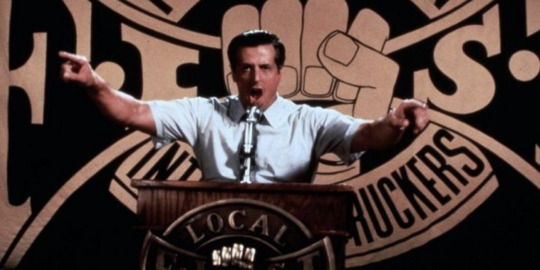
But it was also the year of Paul Verhoeven’s Basic Instinct, the sine qua non of Eszterhas-penned films. And if Sharon Stone’s lascivious leg-cross (Verhoeven’s invention, incidentally, not Eszterhas’) provided posterity with the most iconic upskirt of a blonde in a white dress since Marilyn Monroe’s encounter with a subway grate, that is largely all that remains to us of it today. Well, that and the instantly forgotten sequel (sans Eszterhasian involvement) that already seemed wildly anachronistic in 2006. The original film, its writer, the erotic thriller genre it exemplified, the dunderheaded sexual politics it upheld while attempting to subvert, the whole idea of a mainstream screenwriter having a brand at all (even one as loosely defined as “writer of films you don’t tell your parents you snuck into”), all seem like ancient relics. These are the artifacts not only of a bygone age but of an extinct genus, a whole evolutionary branch that was nipped in the bud so comprehensively that even now scientists might argue over how closely the skeletons of certain bird species resemble the bones of Basic Instinct.
This containment, however, is what makes looking back at the Eszterhas era so fascinating. His brief Hollywood hegemony is a microcosmic event in cinematic history, one with a beginning, middle, and an end (barring some late-breaking epilogue, or a post fade-to-black pan down to an ice pick under the bed). And it didn’t start with his first produced screenplay, for the leaden Sylvester Stallone truckers-union drama F.I.S.T. (Norman Jewison, 1978), although the glimmer of future feats of financial alchemy was already present in the reported $400,000 he received for the novelization. Dawn really broke for Eszterhas, as it did for three of the only other people who could legitimately be termed his peers as purveyors of massively popular, high-concept, low-brow ‘80s sensationalism (producers Don Simpson and Jerry Bruckheimer, director Adrian Lyne), with 1983’s Flashdance.
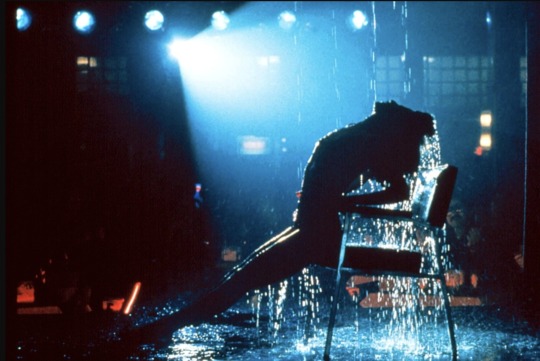
It was an improbable success, less a film than an aerobics video occasionally interrupted by some awkward sassy banter and Jennifer Beals’ popping-flashbulb smile. Its vanishingly thin story, which Eszterhas co-wrote, is of an 18-year-old welder in a steel mill, who moonlights as an exotic dancer while aspiring to become a ballerina—a logline that sounds like a hoot of derision even as an unadorned description—and is full of Eszterhasian hallmarks. There’s the high degree of preposterousness. There’s the gym scene, during which the ladies of the cast grimace and lift weights in full makeup, and while here the frictionless unreality of Lyne’s TV-commerical aesthetic makes the sequence abstract, the peculiar faith in the erotic potential of a workout would recur in the squash sequence in Jagged Edge (Richard Marqund, 1985) and the ludicrous gym date in Sliver (Phillip Noyce, 1993).
And Flashdance also prefigures almost the entire Eszterhas oeuvre in being a story that centers on a woman’s experience and that laudably—if here laughably—positions her career ambitions as at least equal to her romantic aspirations in the mechanism of the plot. But, as elsewhere, it’s a view of women constructed by a proudly unreconstructed man, directed and photographed by men. (Eszterhas’ hard-drinking, womanizing, hellraising, Hunter S. Thompson-of-the-movies persona is enjoyably self-mythologized in his memoir Hollywood Animal.) If anything, what comes across most strongly in Eszterhas’ conception of a “strong woman” is his bafflement when tasked with imagining what such a woman might have going on inside her brain. His filmography may be full of female-fronted titles, and may contain the most famous mons venus in film history, but most of Eszterhas’ work could not be more male gaze-y f it were written from the point of view of an actual phallus, like the closing chapter of his 2000 book American Rhapsody, which is narrated by Bill Clinton's penis, Willard (I am not making this up).
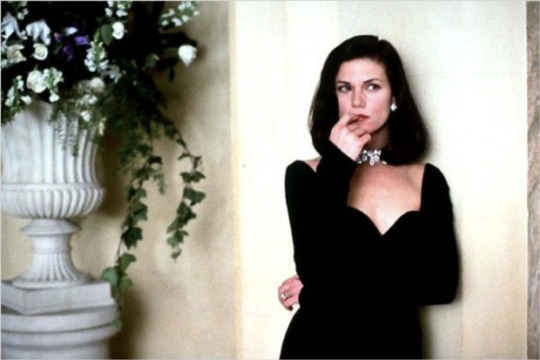
This powerfully eroticized dissociation, this sexualized incomprehension of women as people with interior lives, is the animating idea behind the most Eszterhasian of Eszterhas scripts. But it’s a blank space in which directors, and especially actresses, could sometimes find room to create for themselves. Sharon Stone is genuinely, in-on-the-joke fantastic in Basic Instinct—who else could have delivered “What are you going to do, charge me with smoking?” as if it were an unreturnable Wildean riposte? Costa-Gavras’ Music Box (1989) is by some distance the sturdiest and least dated of Eszterhas movies, a lot due to its comparative sexlessness, but also because of a great, warm, real performance from an Oscar-nominated Jessica Lange. Debra Winger just about wins out in her more thankless role in Costa-Gavras’ first Eszterhas collaboration, Betrayed (1988). And Glenn Close imbues the heroine of the superior thriller Jagged Edge with such shrewdness that it’s almost a liability to the believability of the central deception.
But live by the sword, die by the sword, and when the director/actress combo fails to operate in similar sympathy we get Stone horribly miscast as a… sexy wallflower?… in Sliver, or Linda Fiorentino visibly flailing as a… downtrodden femme fatale?… in Jade, or poor Elizabeth Berkley thrashing wildly about in the neon-lit swimming pool of kitsch that is Showgirls. In these failures, the writer’s almost panicky vision of women as vast, dangerous cognitive black holes is best revealed. But then, mistrust of the opposite sex is only one aspect of the wider mystery that underpins even Eszterhas’ outlier titles: his entire output is preoccupied with how little any of us can ever know anyone.
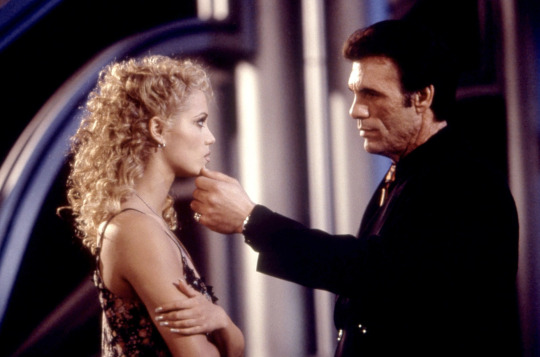
In Eszterhas’ semi-autobiographical Telling Lies In America (Guy Ferland, 1997), a teenage Hungarian immigrant (Brad Renfro) is dazzled by Kevin Bacon's smooth-talking DJ, but blindly unable to work out if he is friend or fiend. Music Box details a lawyer’s dawning disillusionment over her adored father's murderous past—eerily mirroring Eszterhas’ discovery of his own father’s collaboration with the Hungarian Nazi regime. Betrayed has Winger’s FBI agent falling for Tom Berenger’s farmer only to discover he is, in fact, the neo-Nazi she insisted to her bosses he was not, in similar vein to Jagged Edge, in which Close’s lawyer discovers that the lover she successfully defended actually dunnit after all.
Oftentimes, the credulity-stretching ambivalence of these characters is all that powers the suspense, as in the is-she-gonna-kill-him-or-is-she-just-orgasming moments in Basic Instinct. In the misbegotten Nowhere to Run (Robert Harmon, 1993) Jean-Claude Van Damme plays a ruthless ex-con turned valiant protector, his blockish inertia apparently meant to signal that inner ambiguity. More often, it leads to final-act fake-out twists so unmoored to anything like recognizable motivation that they become weirdly weightless, as in Sliver when Stone’s Carly does not know if she’s killed the right man until the final four seconds of the film, and where, had the coin-flip gone the other way, it would still be equally (un)believable.

If it’s part of the egotistical remit of the writer to believe they have an insight into human psychology, it’s remarkable how much of Eszterhas’ oeuvre pivots around how fundamentally unknowable people are to one another. And while that schtick, by which you can’t tell if someone cares for you or is simply a talented sociopathic mimic, resonated briefly at the exact moment when the grasping, solipsistic ‘80s were segueing into the untrustworthy, PR-managed ‘90s, it proved not to have much long-game sustain. Critics had always been sniffy about Eszterhas, who clearly mopped up his tears with massive wads of 100 dollar bills. But when audiences started staying away, like in the Showgirls and Jade-blighted annus horribilis of 1995, the inflationary bubble that allowed Eszterhas to command millions for two-page outlines scribbled, one suspects, on the back of strip club napkins, abruptly burst. The idea of screenwriter-as-auteur, or rather as reliable bellwether of commercial success, proved a fallacy, an expensive experiment that began and ended with Joe Eszterhas, its earliest progenitor, luckiest beneficiary, and biggest casualty.
Glossy, vacuous, adult-themed thrillers were not the only thing going on in Hollywood, and Eszterhas was not the only big-name screenwriter. Shane Black, writer of Lethal Weapon, also commanded astronomical sums for his early ‘90s scripts, but the key difference is that Black wrote in the register of the franchise-able action-spectacular blockbuster that would eventually trounce all others as the Hollywood model for the future. Black has gone on to become part of the Marvel machine as a writer and director, while aside from one Hungarian-language period film, Children of Glory (Krisztina Goda, 2006), Eszterhas’ contribution to the pop cultural landscape post-2000 has been in the form of self-aggrandizing memoirs, or highly public fallings-out with celebrities, like Mel Gibson, of a similarly corked vintage.

The tastemaker point of view has historically been to consider Eszterhas among the worst things that ever happened to Hollywood—so much so that disdain-dripping sarcasm seems to be the fallback for critics summarizing his impact. But while no one is going to make the case for the man’s filmography as some sort of artistic landmark, the Eszterhas era did represent one of the last gasps of a Hollywood that believed, however misguidedly, in personality over product, when the idiosyncrasies, idiocies and ideologies of a single person—a writer at that—could, with studio backing and a 1,500 theater release strategy, influence the cinematic development of an entire generation. That might not have seemed like a good thing but retrospect, like cocaine, is a helluva drug and in 2019, with blandly anonymous, market-tested content churned out by mega-corporations bi-weekly to siphon your hard-earneds away, the kind of salacious tackiness Eszterhas represented feels oddly adorable, even quaint. Now that singular talents—even the obnoxious and objectionable ones—who could make decent returns on mid-budget, adult-oriented mainstream fare, have been steamrollered by infantilizing, monolithic billion-dollar mega-franchises, it’s hard not to be a little nostalgic for the vanished hiccup of time when Hollywood briefly uncrossed its legs for Joe Eszterhas, and Joe Eszterhas told us all what he saw.

24 notes
·
View notes